Categories
PDF Books
- Post author By Ismail ibn Nazir Satia
- Post date 5 March 2023
- 1 Comment on PDF Books
- Sticky post
Mosque imam in Sudan prays against UAE president MB
Muslims generally believe it is wrong to curse your enemies, full stop. Ulama generally promote this, and we agree it is better to forgive. But not everyone is so forgiving and this view indicates Islam has no justice system. The Qur’an talks repeatedly about taking revenge, but the Ulama rarely talk about this:
Prophet Muhammad ﷺ was instructed to do Mubahala with the delegation of Najran:
Say: “Come, let us call our sons and your sons, our women and your women, ourselves and yourselves, then supplicate earnestly [together] and invoke the curse of Allah upon the liars [among us].” — Quran 3:6
Prophet Noah عليه السلام made the following dua against the disbelievers of his time:
لا تذر على الأرض من الكافرين ديارا … ولا تزد الظالمين إلا تبارا
My Lord, do not leave upon the earth from among the disbelievers an inhabitant … and do not increase the wrongdoers except in destruction.
— Quran 71:26-28
The Prophet Moses عليه السلام made the following dua against Pharaoh and his establishment:
ربنا اطمس على أموالهم واشدد على قلوبهم فلا يؤمنوا حتى يروا العذاب الأليم
Our Lord, obliterate their wealth and harden their hearts so that they will not believe until they see the painful punishment.
— Quran 10:88
The Dua of the oppressed is powerful
“And be wary of the supplication of the oppressed, for between it and Allah there is no barrier.” [Sahîh al-Bukhârî]
Sa’eed RA supplicated: “O Allah! If she is a liar, deprive her of her eye sight and cause her to die in her land.” ‘Urwah said: “She did not die till she became blind. While she was walking in her land (concerning which the dispute arose) she fell down into a pit and died.”
[ Bukhari]
ولمن انتصر بعد ظلمه فأولئك ما عليهم من سبيل
“And whoever avenges himself after having been wronged – those have not upon them any cause [for blame].” 42:41
Prophet Muhammad ﷺ made dua against the disbelievers who had wronged him:
ملأ الله قبورهم وبيوتهم نارا كما شغلونا عن الصلاة الوسطى
“May Allah fill their (the infidels’) graves and houses with fire, as they have kept us so busy that we could not offer the middle prayer till the sun had set.”— Bukhari 6396
Ismail ibn Nazir Satia (one who is in dire need of Allah’s forgiveness, mercy and pleasure)
15th Shaban 1447

My father was the strongest man I know.
No matter how heavy life became, he carried it on his shoulders with patience and quiet strength.
He sacrificed so much without ever asking for anything in return, always working, always providing, always protecting.
His love might not always be loud, but it’s in everything he does.
I’ll forever thank Allah for blessing me with a father like him.
A man of dignity, wisdom, and the purest intentions.
Despite the burdens he’s faced, he’s never stopped being a pillar of strength and love.
I pray that every hardship he endured is turned into ease for him in the hereafter.
And that every silent tear becomes a means to Jannah.
I’m so proud to be his son.
Allah preserve him, reward him, and always keep him close to my heart. Allah give you the best place in Jannah,
Ameen
13 years today for my beloved father
Ismail ibn Nazir Satia (one who is in dire need of Allah’s forgiveness, mercy and pleasure)
English Summary of the talk delivered by Shaykhul Islām Mufti Muhammad Taqi Usmani {Ḥāfiẓahullāh}
Tuesday 4th November 2025 at Taiyabah Masjid, Bolton UK.
In the name of Allāh, the Most Merciful, the Most Compassionate.
All praise is due to Allāh, the Lord of all the worlds.
Peace and blessings be upon His noble Messenger, upon his family, his companions, and upon all those who follow them with goodness until the Day of Judgement.
My respected and beloved brothers,
Assalāmu Alaykum wa Rahmatullāhi wa Barakātuh.
All praise is for Allāh — I have been coming to the United Kingdom repeatedly, and each time I come, I notice, Alhamdulillah, that our Muslim brothers here are showing progress in their efforts to preserve and strengthen their faith.
Masjids are being established, maktabs (religious schools) and madrasas are running, and every time, I see more improvement than before.
May Allāh bless all your efforts and grant you success in this world and the next.
Among all the European countries, this is perhaps the only one where Muslims have made such strong efforts to safeguard their religion and the faith of their future generations — and, to a great extent, have succeeded.
May Allāh increase you in goodness and unity, Ameen
The Central Message
All the respected people gathered here are believers and attached to the masjid and the faith.
On this blessed occasion, I wish to share a topic that is deeply important — not only for us but for the entire Muslim Ummah.
Today, Muslims number around two billion across the world.
There are 57 Muslim-majority countries.
We have immense wealth, countless resources, and our lands occupy some of the most strategic locations on earth.
We have oil, gold, and other riches — blessings like never before in history.
Yet despite this, Muslims as a community are weak, dependent, and disunited.
We depend on others for everything — in education, economy, defence, and even in our basic self-reliance.
Why is this the case?
The Prophet ﷺ already foretold this
The Messenger of Allah ﷺ once told his Companions that a time would come when other nations would invite one another to attack you just as people invite others to share in a feast spread on a dining table.
The Companions were shocked and asked,
“Will that be because we will be few in number, O Messenger of Allah?”
The Prophet ﷺ replied,
“No, rather you will be numerous — but you will be like the foam on the sea — many in number but weightless.”
That is our condition today: a vast population but without strength or direction, swept away by every current because of a lack of unity and inner power.
*Why has this happened?*
Allāh says in the Qur’ān:
“You will be the most superior, if you are true believers.” (Qur’ān 3:139)
But despite this promise, we see Muslims living in humiliation and dependency.
So what is the root cause?
A great scholar, Shaykh ul-Hind Maulana Mahmood Hasan رحمه الله, who was imprisoned by the British during their rule, said after his release that he had pondered deeply during his years in jail over the causes of Muslim decline.
He concluded that there are two main reasons:
Muslims abandoned the Qur’ān.
Not just in recitation, but also in understanding, implementing, and conveying it to others.
The four duties regarding the Qur’ān,
recitation, understanding, practice, and propagation — have been neglected.
Muslims became divided among themselves.
Differences are not always evil, but when disagreement leads to factions, hostility, and hatred — that is tafarraqu (division), and it destroys nations.
Qur’ān on Unity
Allāh says:
وَاعْتَصِمُوا بِحَبْلِ اللَّهِ جَمِيعًا وَلَا تَفَرَّقُوا
“Hold fast, all of you, to the rope of Allāh, and do not be divided.”
(Sūrah Āl-Imran 3:103)
The Prophet ﷺ united the Companions so beautifully that Bilal RA — an Abyssinian — was respected by Arabs as their leader, and Salman al-Farsi RA — a Persian — was made commander among Arabs.
This was the blessing of Islam, which erased all divisions of race and language.
When the Muhajirun (migrants) arrived in Madinah, the Ansar opened their homes and even offered to share their wealth and families. Such was their spirit of sacrifice and brotherhood.
Once, an argument broke out between an Ansari and a Muhajir, and each called out to his group for support — “O Ansar!” and “O Muhajirun!”
When the Prophet ﷺ heard this, his face changed with anger and he said:
“Leave these calls, for they are foul. These are the slogans of ignorance.”
Whenever Muslims have fallen into disgrace, it has often been due to tribalism, nationalism, or group identity.
Nationalism and Racism
The Ottoman Empire — once a unified Muslim world — was destroyed because the Turks were told, “You are Turks; why follow the Arabs?”
And Arabs were told, “You are Arabs; why follow the Turks?”
Thus, unity was broken, and the Ummah fragmented into weak states dependent on others.
Allamah Iqbal RH expressed this beautifully:
“The idol that the new civilization has raised the highest is the idol of the homeland (nationalism); the robe it wears is the shroud of religion.”
Islam recognizes one homeland — the Ummah.
Whether Arab, Persian, African, or Indian — a Muslim is a Muslim.
Religious Division
Another cause of weakness is sectarian division — not diversity of thought itself, but hostility over it.
There have always been differences — between Hanafi, Shafi‘i, Maliki, Hanbali — in jurisprudence and practice.
But the Companions differed too, and yet none refused to pray behind another.
All four schools are based on sound scholarship; none is false.
Differences are natural. What is wrong is turning difference into enmity.
When Divisions Destroyed Muslims
During the Mongol invasion, when the armies of Hulagu Khan were at the gates of Baghdad, the scholars inside the city were busy arguing whether eating crow was halal?
The enemy destroyed Baghdad while the learned were busy debating petty issues.
As a poet said:
“Give glad tidings to the Muftis — your debates have completed the enemy’s mission.”
The Tigris River was flowing red with the blood of Muslims.
Lessons for Muslims in the West
Here in Britain, Alhamdulillah, Muslims have made efforts to preserve their faith.
But beware: do not import the divisions of Pakistan, India, or the Arab world into your Masjids here.
You face much bigger challenges — atheism, secularism, and the loss of faith among your children.
Instead of arguing over sect or language, unite to protect your next generation from disbelief and immorality.
Whether Deobandi, Barelvi, or Salafi — when it comes to shared causes like faith, family, and future — be one body.
Hadīth on Avoiding Disputes
The Prophet ﷺ said:
“I guarantee a house in the gardens of Paradise for the one who abandons argument, even when he is right.” (Abu Dawood)
Even if you are right, if continuing an argument will lead to bitterness, let it go.
Mufti saheb gives an example of his own father, a great scholar, Mufti Muhammad Shafee RH who once had full legal rights over a piece of land for a madrasa.
When someone began disputing ownership, he said, “I will not build an institution on the foundation of dispute.”
He left it all — the land, the rooms, the phone line — and started anew elsewhere.
That Madrasah later flourished far beyond the first location.
He preferred peace over contention, trusting Allah for success.
Final Advice
Muslims must revive the spirit of brotherhood.
Whoever says “La ilaha illallah” is your brother — regardless of race, language, or school of thought.
If you see a fault in your brother, correct him gently, privately, with love — not with harshness or public shaming.
As the Prophet ﷺ said:
“A believer is the mirror of another believer.”
Just as a mirror quietly shows one’s faults without spreading them, a believer should lovingly guide another.
Conclusion
Our unity is our strength.
Our divisions are our downfall.
Let us hold fast to the Qurʾān and the Sunnah, avoid disputes, and work together to safeguard our children, our faith, and our future.
May Allāh unite our hearts, forgive our shortcomings, and make us worthy of representing His Deen with honour and sincerity. Āmīn
I have walked into churches and nobody called me a “paki.”
I have visited synagogues and nobody called me a “radical.”
I have seen the Hindu temple and nobody called me a “terrorist.”
It is only when you attend a Gujarati Masjid you get told:
“This is our turf”
“Surtis not welcome”
“What you lot doing here?”
Welcome to racist Blackburn!
Bharuchi racism is common and Surti racism is common, my rules are fair. I’ve also written about a Surti mufti who contaminated the mimbar once with his racist bile. But today’s message is for those who say I am not welcome to the bharuchi masjids, you remind me of the incident when Bilal (Allah be pleased with him) gave Adhan on the Kabah:
“Thank God that my father died before this happened, and he did not have to see this bad day. Harith Ibn Hisham remarked: Could Muhammad not find anyone better than this black crow to sound the adhan in the Sacred Mosque!”
“The Quraysh were angered upon seeing a black Ethiopian slave give Adhan on the Kabah. Just like members of the bharuchi community were angered upon seeing me in their masjid. The Prophet ﷺ remarked on hearing these comments: these are traits of ignorance and arrogance.
Bharuchism Vs. Surtism
There is no doubt every community has their praiseworthy traits and every community has their weaknesses, but some people only focus on the praise, which naturally feeds their egos. Anyone living in Batley/Dewsbury/Leicester will agree many from the Bharuchi and Surti community love to criticise others, but failed to look in the mirror and focus on their own faults. I’ve had many messages and calls yesterday from people around the country who agree that racism from these two communities is deep, destructive, it’s vile, it’s vulgar.
The Iron Dome
When you are reading these messages, remember it’s 40 years of racism I am talking about, from BOTH communities. Hence, some bharuchis and some surtis can’t fathom what I am talking about, because you don’t face this level of racism, we do. Over the years, I have fired a few missiles and rockets back at the racists, only to realise they didn’t accept a WORD of criticism. But they were happy to criticise others? Hence we give the example of the iron dome, some of you have this iron dome above your heads where the rockets are only fired one way. We have eyes, we will criticise you too! People in glass houses shouldn’t throw stones.
Fairness and Justice⚖️
I also receive a lot of love and respect from the Bharuchi and Surti communities, like those who accepted the fact Tauheedul Islam Masjid and the community at large need to work on their egos and arrogance. Too many of your ulama are defensive, never accept facts, hence Allah doesn’t guide them, Allah doesn’t guide the arrogant. There’s a lot of good in these communities but your people spoil it by having this baseball bat attitude. I’m not just talking about the Imam, don’t assume things, your young ulama are very egotistic too!
The good is also unforgettable, the ones who replied to me yesterday from Bicknell are the ones I knew would accept facts. There are many Bharuchis who stand for truth and justice, without any bias. The Surti community needs to take a leaf out of their book, too many passive and apathetic in the Surti community, very few speak out. In same breath, I will remind the bharuchi community just because you speak haqq – I speak haqq too, alhumdu lillah – don’t get over confident where your arrogance takes over. No doubt that’s a reminder for me too.
Equally, there’s a lot of good in the Surti community which bharuchis can learn from, their humility and softness. Surti masjids thrive because of this quality, they have disagreements too, minus the baseball bat! Allah loves humility, and the bharuchis need to learn from them, lower yourselves and swallow your pride. At the same time the greatest weakness of the Surti community is you need to be more open and honest. Other communities dislike you for this one quality which destroys all good you do. This is sincere advice and it is upon the individuals to accept, I have accepted your criticism for decades.
A Sign from Allah SWT
Alhumdu Lillah, our prayers have been answered by Allah SWT through the voice of Mufti Taqi Uthmani Saheb.
Last night in Tayyabah Masjid, Bolton.
Coincidence or Godincidence?
The Fish Rots From The Head
When it comes to deep levels of racism, it starts from the cream of the crop, the Ulama. If you are that naive individual who still believes that all Ulama are infallible and angels – skip this ad – Ulama are human and far from perfect. One of the reasons we have so much racism in society is the Ulama, those that teach in schools and madrasah are the ones who take the lion’s share of the blame. They are the ones who spread hatred from the mimbar, which could have been used to spread love.
Imam Ghazali (Allah have mercy on him) writes, “You will seldom find a man who is racist and intelligent. You will rarely find a man full of malice and intelligent.” A profound message for our racist friends. Unity is key, we are a minority in this country and we need to remember when the far right attack you they will not ask, are you Bharuchi or Surti? Only Muslims ask that! Wallahi there are many that ring me for my services and ask, are you Surti or Bharuchi? That’s just racist, please use people from your own village if that’s how much it means to you.
This concept is hard for many in Blackburn to digest, hence the community will never accept that Ulama can be racist, until they are victims themselves. Which is really selfish.
“Verily, before Qiyamah people will only greet those that they know.”(Musnad Ahmad)
One of the best remedies for racism in the Masajid is to start doing Salam with each other. The hadith above is apt in today’s day and age.
Considering tomorrow is Jumuah, every Indian should do Salam to every Pakistani and vice versa, no hugs, no kisses, just salam … calm down. We see Muslims meet each other everywhere, even in the Masjid, but we only do Salam to those who we know, this is a disease of the heart.
Ismail ibn Nazir Satia (one who is in dire need of Allah’s forgiveness, mercy and pleasure)
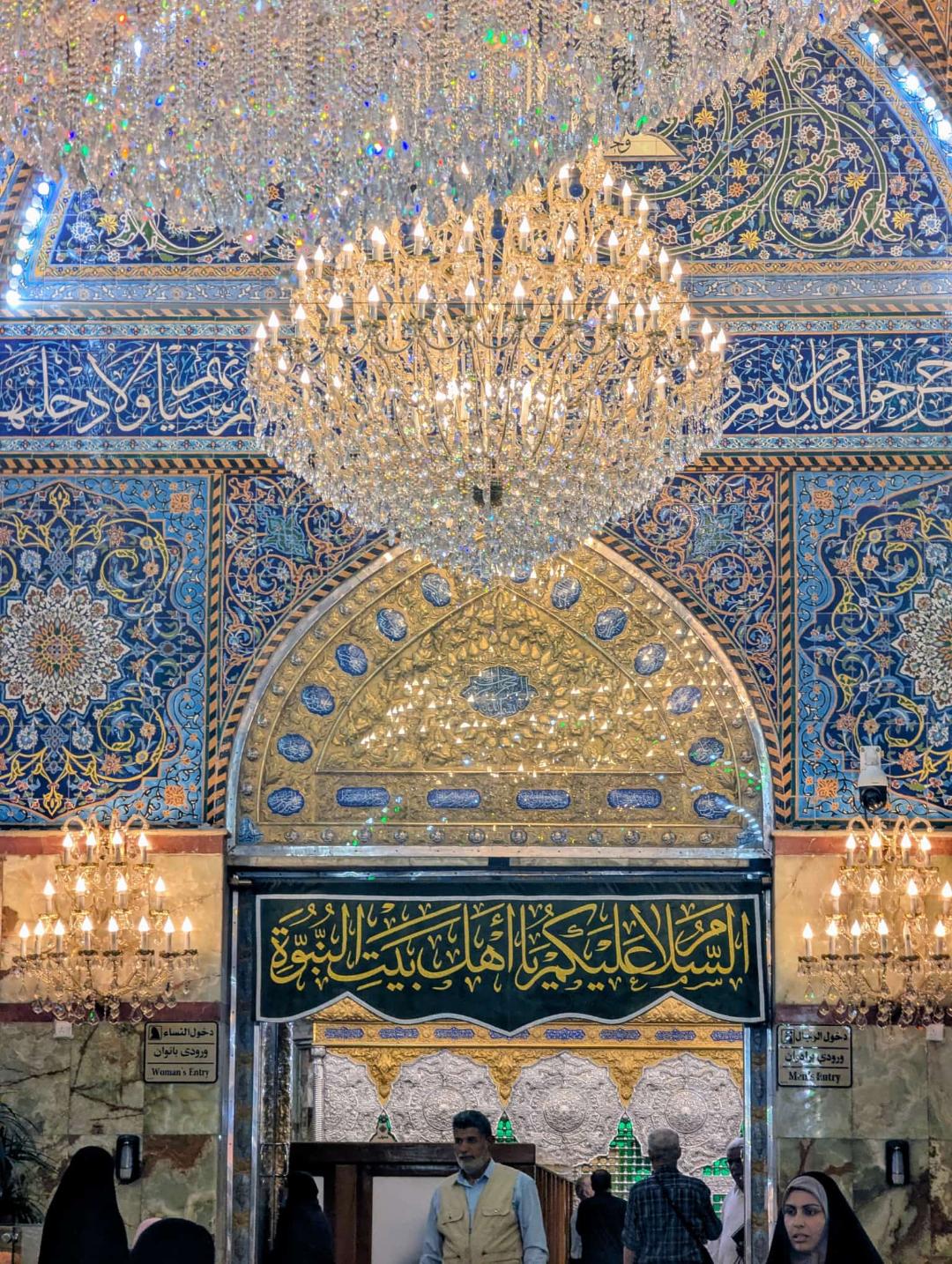
From Blackburn to Baghdad
Alhumdu Lillah, we have just spent seven days in Iraq. It was a profound sacred journey into the heartland of Islamic heritage, many Prophets ﷺ, revered Sahabah RA, Ahle Bayt, knowledgeable Imams and pious Saints graced these very lands. I will share a few notes and thoughts from the visit to Baghdad, Najaf and Karbala. Before I do that, I want to remind everyone when you think of Iraq in modern times, what do you think of? Who do you remember?
No doubt, you will remember the war also referred to as the Second Gulf War from 2003 – 2011. USA invaded Iraq, the primary rationale for the invasion centered around false claims that Iraq possessed weapons of mass destruction. But no WMD stockpiles were found in Iraq. Thanks to the likes of Jack Straw the then Blackburn MP, aka the architect of the Iraq War, the war led to over a million deaths, young girls being raped and the abuse in Abu Ghraib prison. Some of you may remember the letters that came out of these prisons…
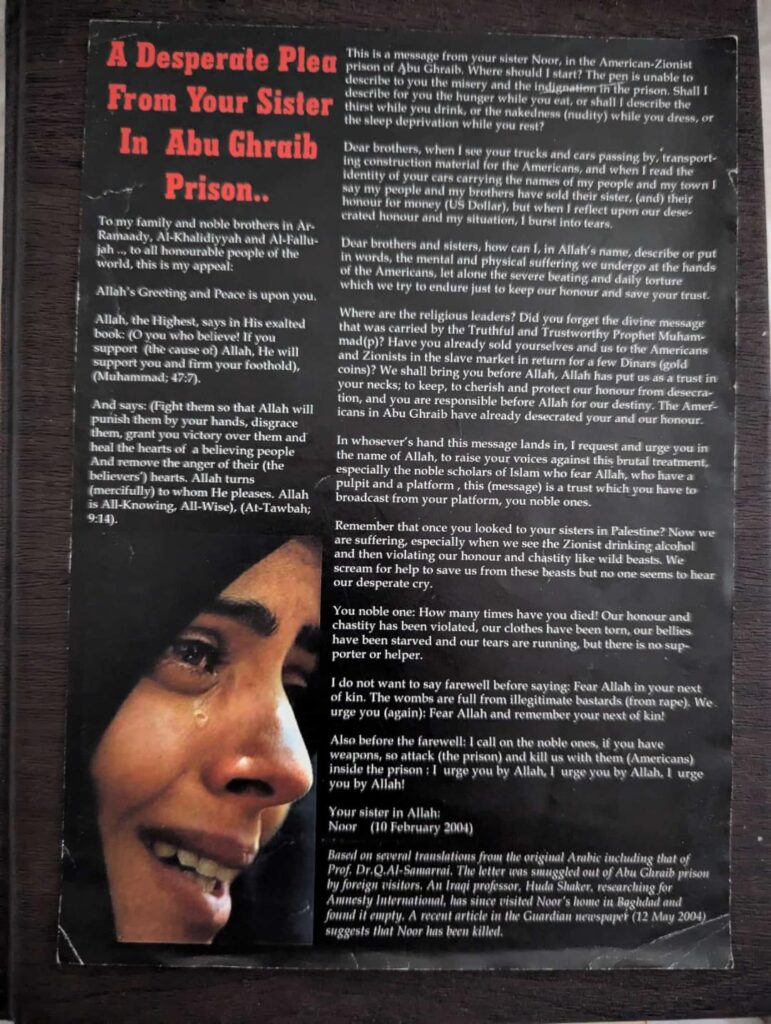
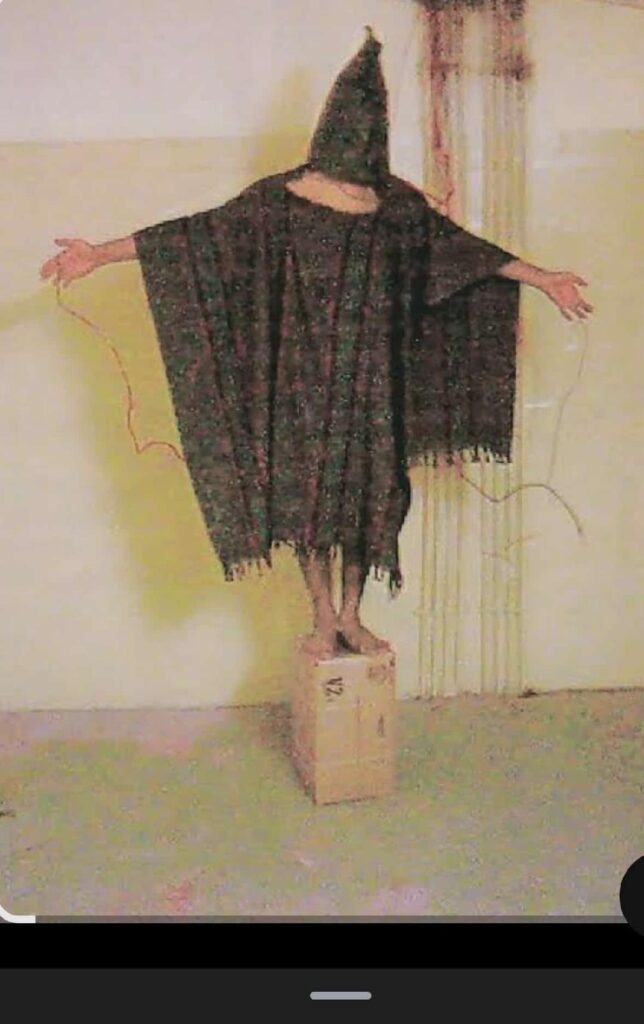
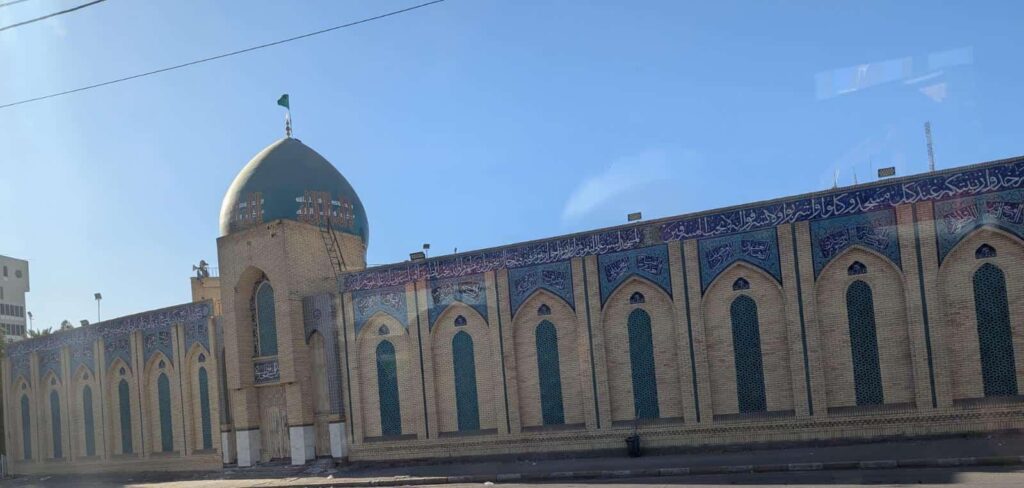
Day 1
The intention when going to these places is Ziyarat/visiting/learning. You cannot make an intention for thawab/reward: Narrated Abu Huraira: The Prophet ﷺ said,
"Do not set out on a journey except for three Mosques ie Al-Masjid-Al-Haram, the Mosque of Allah's Messenger ﷺ , and the Mosque of Al-Aqsa."
Alhumdu Lillah, on our first day in Baghdad we visited the mausoleum of Sultanul Awliya Shaykh Abdul Qadir Jilani RH. Shaykh was born in Gilan, Iran in 470 A.H. Shaykh was an Arab by descent, being the tenth descendant of Hassan ibn Ali RA. He came to Baghdad in 488 A.H. at the age of 18. After completing his education of religious sciences, he turned to Mysticism/Sufism. Shaykh later became one of the Imams of tasawwuf and Allāh SWT endowed him with many karamaat (miracles).
There is an account narrated about Shaykh Abdul-Qadir Jilani, Allah have mercy on him, that when he set out away from home for the purpose of his education, his noble mother sewed his share of eighty coins into the underarm of his shirt and advised him: ‘Son, do not lie.’ When Shaykh Abdul-Qadir RH departed, on the first day of his journey he passed through a jungle that was inhabited by a large band of thieves and robbers. A party of robbers confronted and apprehended him. The robbers asked: ‘What have you in your possession?’ Shaykh Abdul-Qadir thought to himself that he was being tested in the first stage of his journey; he reflected over his mother’s advice and said:‘I have eighty coins which my noble mother has sewn into the underarm of my shirt.’ The robbers were extremely surprised on hearing this and said: ‘What is this dervish saying! We have never seen such a righteous man!’ They took him and putting him before their chief, related the entire story. When the chief questioned him, Shaykh Abdul-Qadir gave the same response. Finally, when his shirt was torn at the place that he had described, it turned out that there were indeed eighty coins sewn into his shirt. All the robbers were astonished and the chief asked why Shaykh Abdul-Qadir had told them the truth. At this, Shaykh Abdul-Qadir mentioned the advice that his mother had given him...He said: ‘I have set out as a student of religion. If I had told a lie at the very first stage of my journey, what could I ex- pect to attain? And so, I chose to stand by the truth.’ When Shaykh Abdul-Qadir said these words, the chief burst into tears, fell at his feet and repented for his sins. It is said that this chief was the first follower of Shaykh Abdul-Qadir.
In short, truth is a thing that delivers a person in even the most trying and difficult of times.
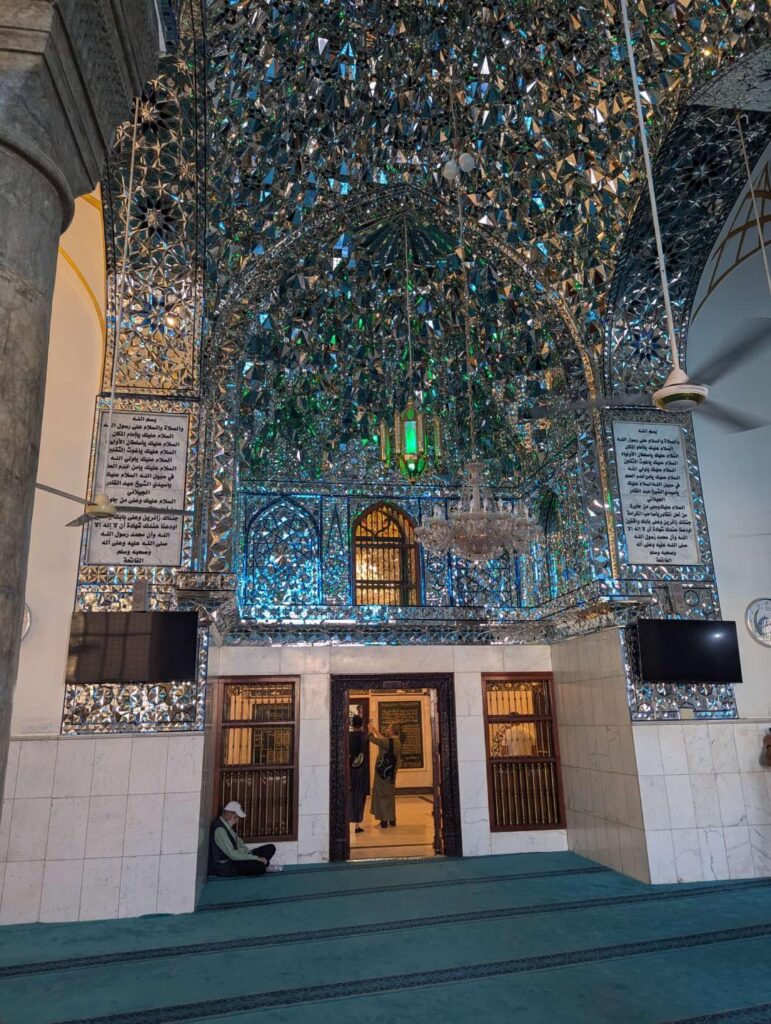
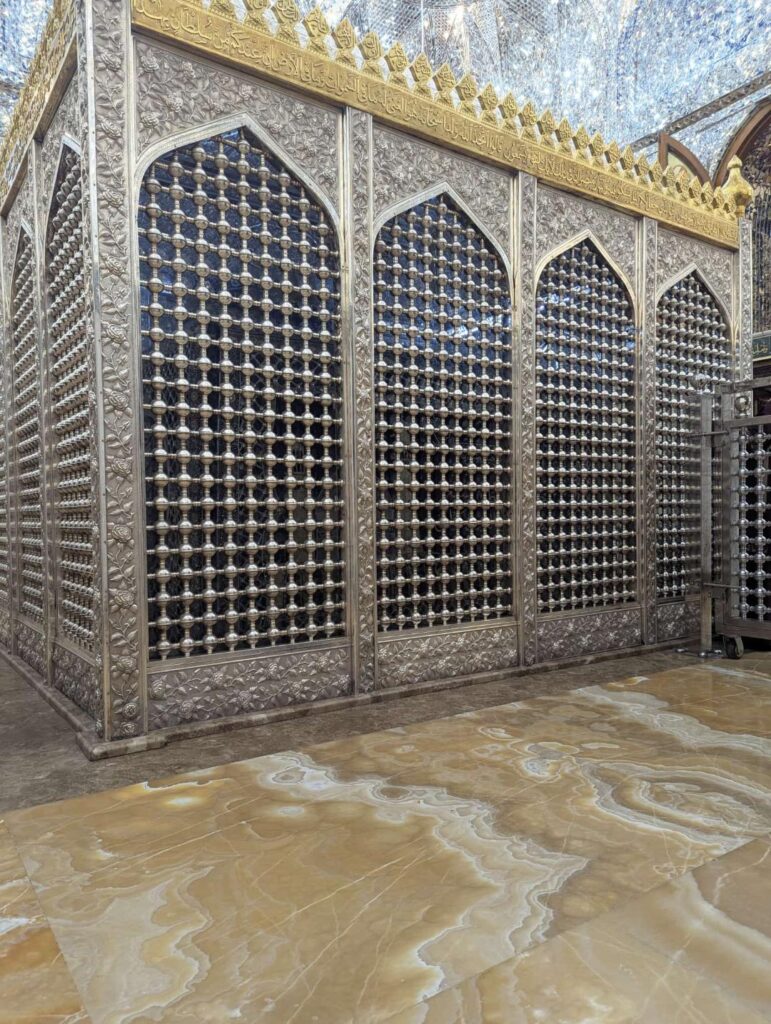
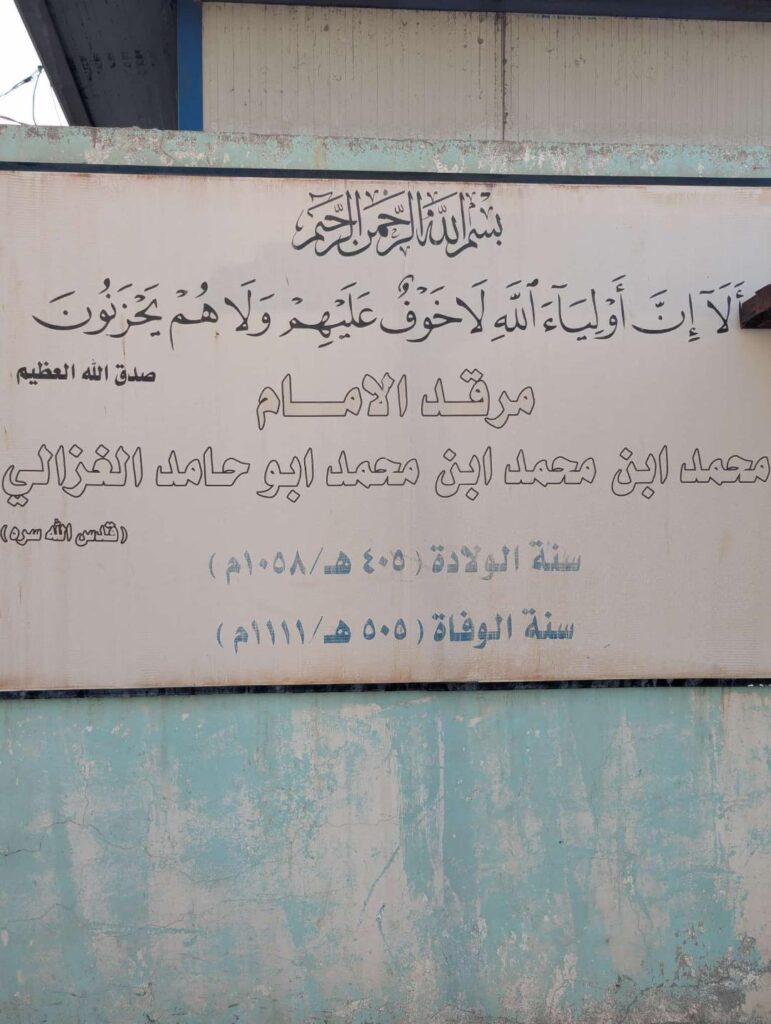
We visited the grave of Abu Hamid Muhammad Ibn Muhammad Al-Tusi al-Ghazali, born 1058-1111, Tus, Iran. Imam Ghazali RH is one of the great jurists and mystics of the 12th century. He wrote on a wide range of topics including Jurisprudence, Theology, Mysticism and philosophy. He was titled the Intellectual Proof of Islam and the Bane of the Philosophers. From childhood Imam Ghazali's inquisitiveness and unquenchable thirst for comprehension of reality was unmatched.Imam Ghazali RH was often scolded by teachers for asking too many questions and engaging in debate. His passion for knowledge is shown from the story below:
Having completed his studies, Imam Ghazali was en route back home. On the way the caravan in which he was traveling was waylaid by robbers. Together with his co-travellers, Imam Ghazali was dispossessed of all his goods. Amongst his possessions were the carefully written notes of the lectures delivered by his ustads. These notes were also taken by the robbers. Imam Ghazali sought out the leader of the band of robbers and pleaded with him...“Your men have taken all my possessions except for the clothes I wear. You may keep the extra clothes and other valuables – I do not lament their loss. However, please ask your men to return the papers they have taken.”
The leader of the band of robbers was amazed at this unusual request. This young man was not worried about clothes and valuables, but he was asking for some pieces of paper to be returned!
Very curious, he asked: “What papers are these?”
Imam Ghazali explained: “I am a student returning home after completing my studies. When my teaWhen my teachers used to lecture, I used to make notes. These are those very pages of ‘ilm that I am requesting to be returned to me.” The leader of the robbers said: “What you have just said fills me with great sorrow and regret. Young lad! Is your ‘ilm on pieces of paper when it should have been in your heart? Papers can get lost. Papers can be destroyed by fire, become parched by the sun, get eaten by moths, become damaged with damp, etc., etc. You are dependent on papers? It fills me with great pity. Your ‘ilm should be in your heart! Be that as it may, your papers will be returned.” He summoned one of his men and ordered him: “Give back to this boy his papers.”The notes were retrieved and returned to Imam Ghazali.
Imam Ghazali was of noble character. He was, moreover, a dedicated student. The words of the gang-leader were like a knife piercing his heart. On reaching home, he lost no time in memorizing all his notes.
These were the scholars of the past who sacrificed everything for knowledge, their dedication is admirable and their zeal for the truth is commendable. This is what shapes history and inspires generations, Allah grant us similar qualities, Ameen.
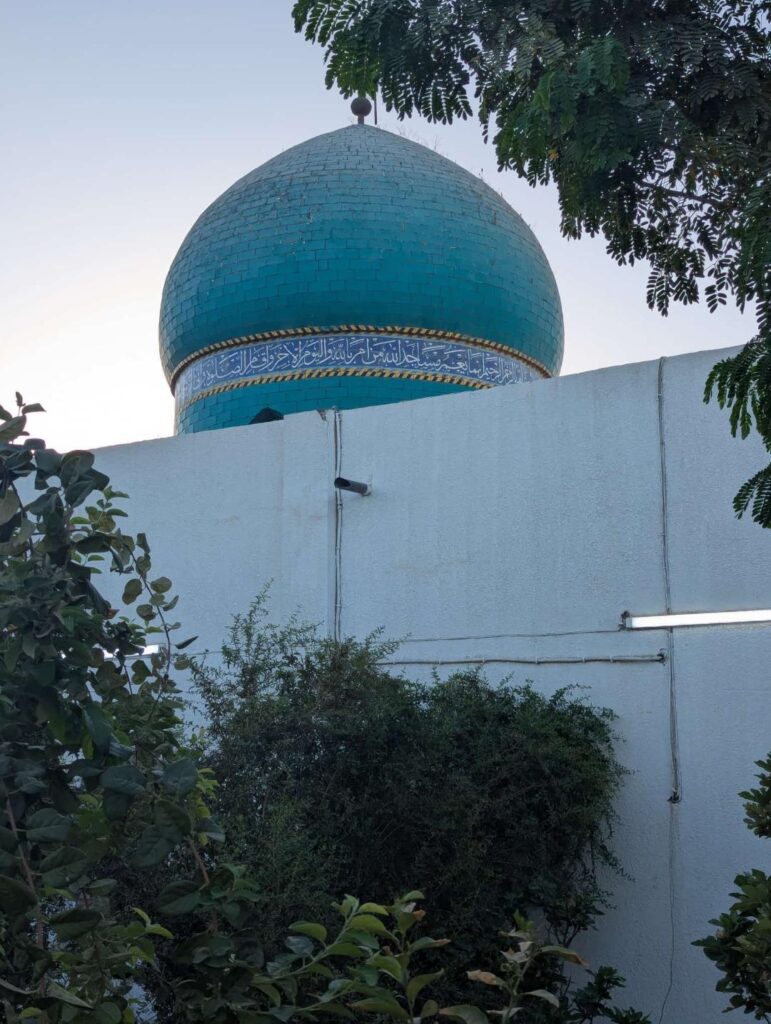
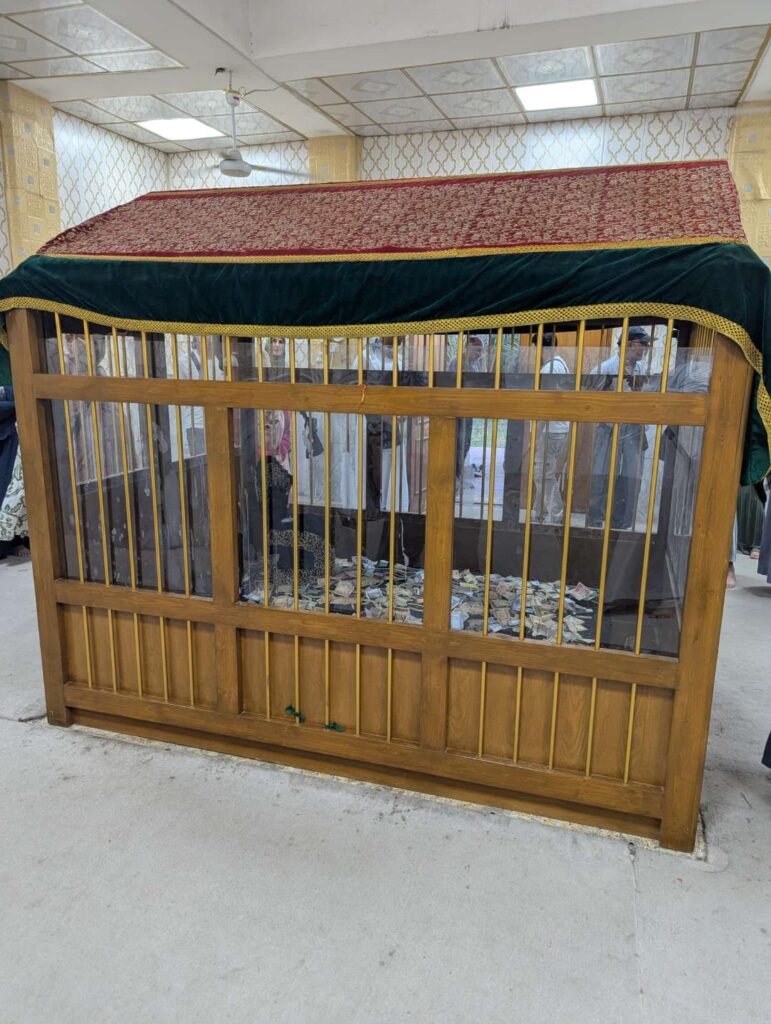
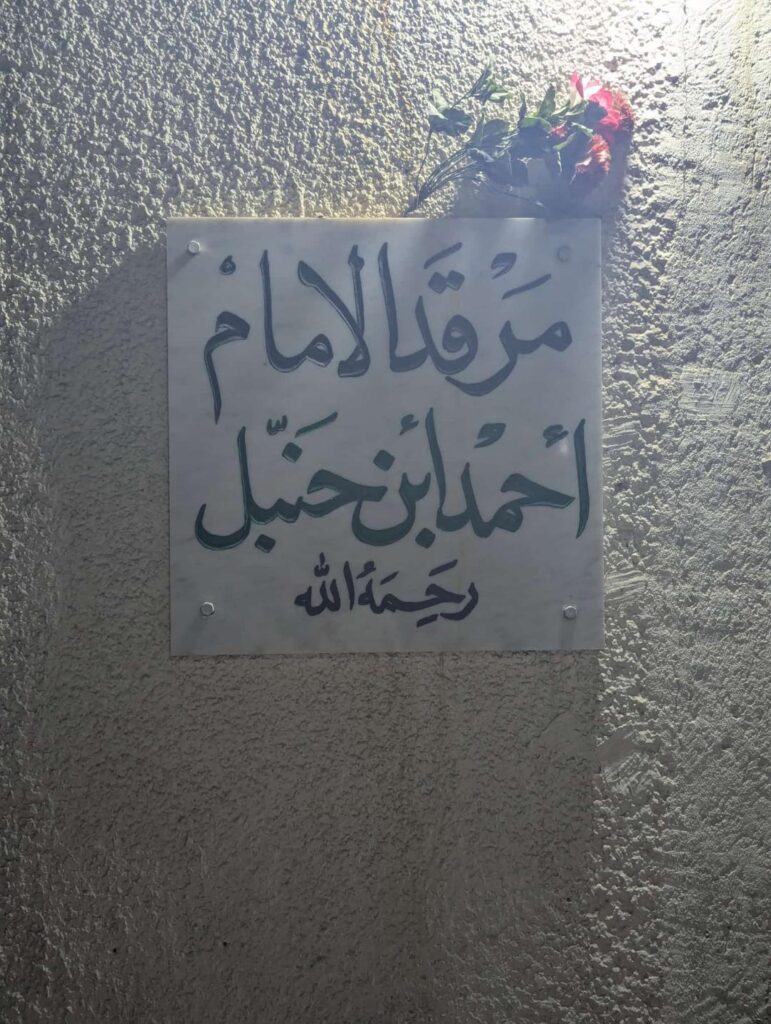
One of the greatest disappointments of this journey was the grave and house of Imam Ahmad RH had not been looked after. Most tombs in Iraq were well looked after as you saw yesterday and the day before, some with gold plated doors and chandeliers on the ceiling. In the following pages you will see how well and preserved the Shia sites are. Imam Ahmad RH was one of the greatest Sunni Imams, his largest following is in Saudi Arabia and they should fund the upkeep of his tomb.
In the earlier part of the second century, an ideology called Itizaal creeped into the Ummah. The people following this ideology were know as Mutazilah. This group were regarded as rationalists and philosophers. They would try and justify Islamic teachings and beliefs through ration and intellect. Their centre of focus were mainly issues like the attributes of Allah Ta’ala, seeing Allah in Jannah, predestination, free will, and the nature of the words of Allah, Ta’ala.
They gave preference to intellect, ration, and philosophy over the Divine revelation sent by Allah Ta’ala and over the words of his Prophet ﷺ.This ideology gained popularity during the reign of Mamun Rashid, so much so that it turned into a state religion, and their views were imposed upon the people, and the masses were forced to accept them.
The issue of the nature of the words of Allah Ta’ala, the Quran, became a major tenet of this school of thought and it was considered a criteria for determining ones adherance to the Mutazili school of thought. The Mutazilis held that the Quran (The words of Allah) are a creation of Allah, whilst the Ahlul Sunnah Wal Jamaat maintained that the words of Allah are an attribute (sifat) of Allah and not a creation of Allah.The Mutazilis would punish and torture those who wouldn’t accept their views. Mamun Rashid once summoned all the big Ulama of the time to question them with regard to their beleifs about the nature of the words of Allah Ta’ala. Some of those scholars accepted the views of the Mutazilis, out of fear, whilst other scholars stayed firm on the belief of the Ahlul Sunnah. Out of them, some such as Ishaq Ibn Ibrahim, Bishr ibnul Walid, and Ibrahim al-Mahdi were executed, and many were thrown into prison.
After some time, Imam Ahmad RH was brought before the governor in Baghdad. He was tied with four chains fastening his legs and was told to submit tHe was then brought in front of the Caliph. The Caliph ordered that Imam Ahmad RH should be given 34 lashes. After each whip, Imam Ahmad would say, “Give me some proof from the Quran or Sunnah, then I could accept your view. Imam Ahmad RH was imprisoned and tortured for 28 months. People who felt for him, would visit him and narrated the Hadith to him, that in such a situation one is allowed to even utter words of Kufr to save ones life. Imam Ahmad RH would reply, “But what do you say of the Hadith of Khabbab which says that there were people who were slaughtered into two, but they did not give up their faith.” Subhan Allah!
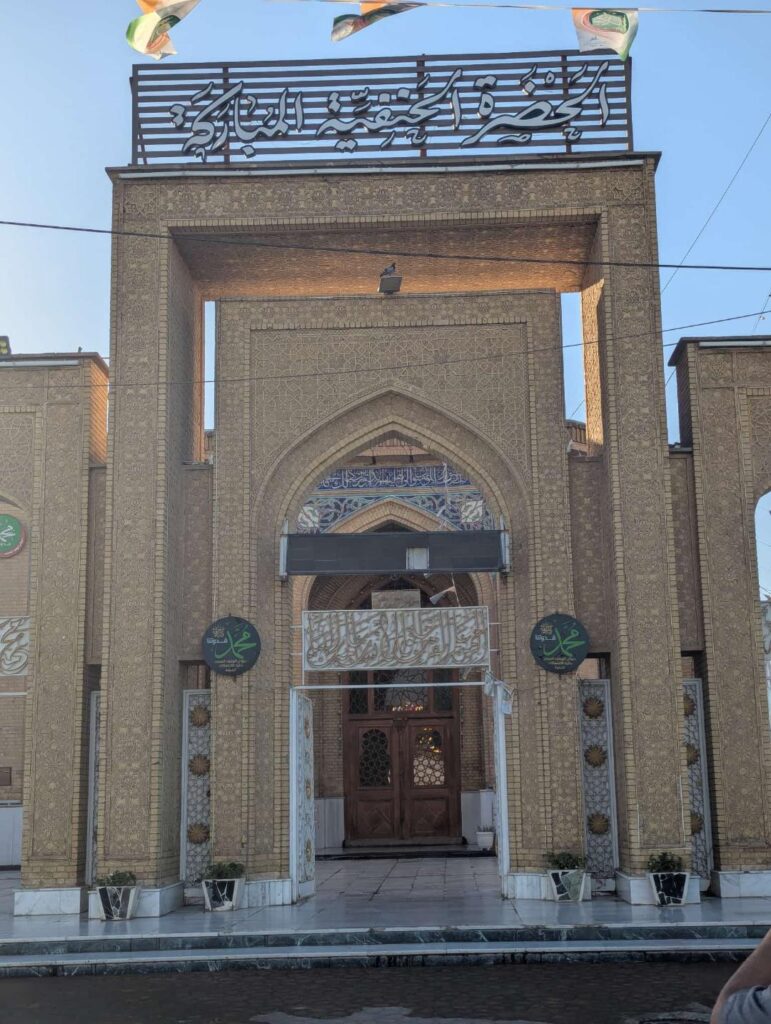
Day 2
Imam Abu Hanifa's RH full name was Numan ibn Thabit. Imam Abu Hanifa RH was born in Kufa in the year 80 and passed away in 150 after hijrah. Imam Abu Hanifa RH is the first of the four Imams of the different schools of thought. It is the Sunnah of Allah SWT that He executes His will through some natural means which serves to strengthen the faith of those who examine these signs and ponder over them. History reveals that in Islam's darkest times this religion was safeguarded through beacons of light in the form of the righteous individuals who upheld Islam.
Imam Abu Hanifa: The Juggernaut of Jurisprudence
Abu Huraira RA narrates the Prophet ﷺ said: "If deen was suspended from the Thurayya star (Pleiades) and the Arabs are unable to reach it, then a man from the sons of Persia will be able to reach it." (Saheeh Muslim).
Allamah Suyuti RH mentions that this hadith refers to Imam Abu Hanifa RH. The reason being there was nobody equivalent to that level of knowledge during his time.One of Imam Abu Hanifa’s first areas of focus was the subject of Aqidah. Aqidah is the study of Islamic theology, which was threatened by the deviant ideologies festering in Kufa at the time. Imam Abu Hanifa RH would champion the field, debating against the figures of the aberrant creeds. One of the most noteworthy stories of Imam Abu Hanifa RH that highlighted his knowledge was his confrontation with an orator from the Romeo-Christian land. The man posed three questions: Where is Allah (SWT) facing, what was before Allah (SWT), and what is Allah (SWT) doing right now?In his response to the first question, Imam Abu Hanifa RH lit a candle and asked the man where the light of the candle was facing. He declared, similar to how the light of the candle was not directed one way and filled up the room, the same was true of the nur (blessed light) of Allah SWT. On the next question, Imam Abu Hanifa RH had the questioner count back from ten. He encouraged the questioner to continue after number one and the questioner responded that he could not. Abu Hanifa said in the same way, we do not entertain a “before” to Allah SWT because it is out of our comprehension. Before answering the last question, Imam Abu Hanifa RH requested to give his answer from a high placeThe questioner obliged and Imam Abu Hanifa RH responded to the last question saying Allah SWT had disgraced the questioner by giving the higher physical state to the one who protected his Deen.
Allah grant Imam Saheb coolness in his grave and a lofty status in Jannah, may we follow in his footsteps, Ameen.

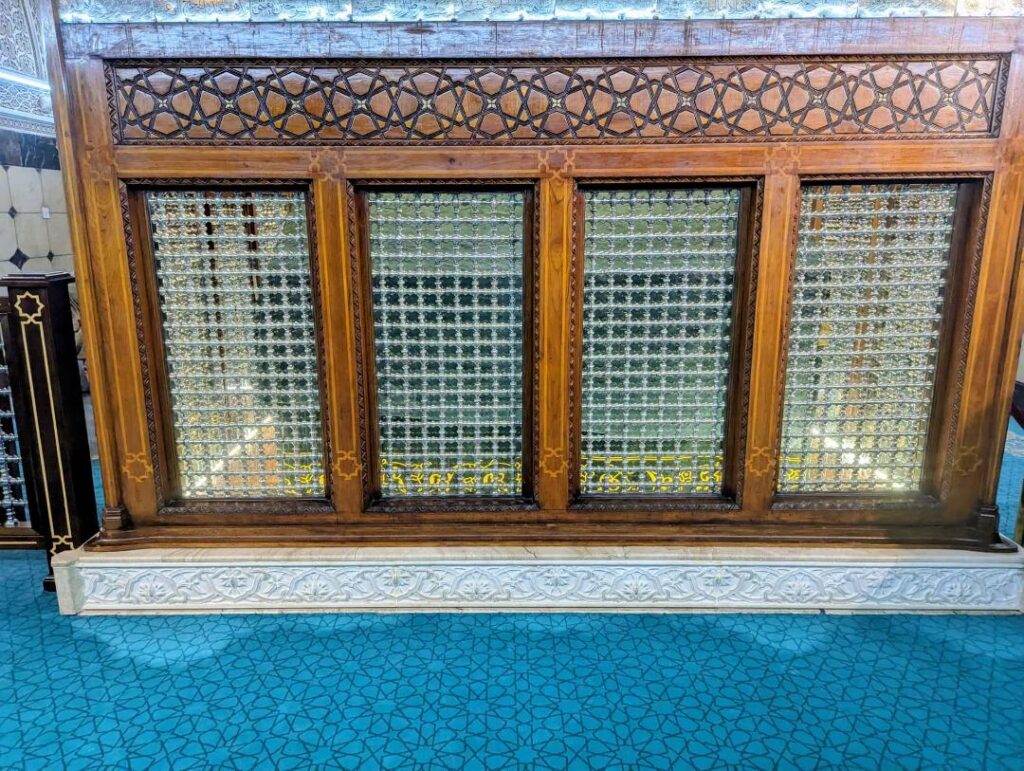
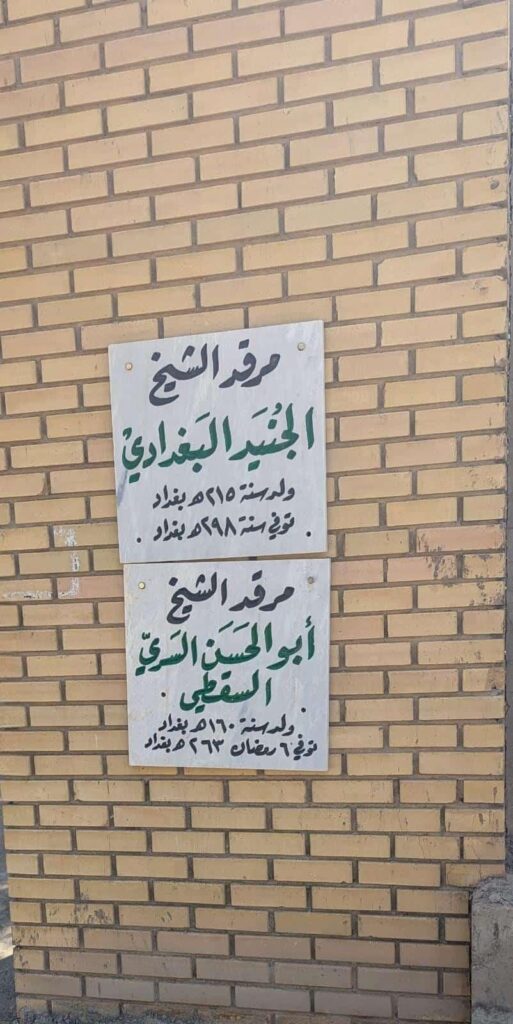
Junayd al-Baghdādī’s efforts were instrumental in bridging the gap between taṣawwuf and the scholars of fiqh, reconciling their perspectives and earning him broad recognition within Ṣūfī circles. For his commitment to engaging with society and guiding the people without retreating into isolation, he was honoured with the title Sayyid al-Ṭāʾifah (Master of the Ṣūfī Order). In the following, we take a brief glimpse into the eventful life and legacy of Imām Junayd al-Baghdādī RH.
Prior to sainthood, Junaid Baghdadi RH was a skilled warrior and an undefeated world-renowned wrestling champion. One day the King of Baghdad issued a challenge, “Today, if any man defeats Junaid, I will give him whatever he asks.”
A man came forth and accepted the challenge. The crowd gasped in shock for the man was feeble and weak. So weak that his skin was hanging off his bones. The King remarked “It seems that death is calling him. How will he beat Junaid? He won’t withstand a slap.” The man remained firm in his call, he wanted to fight. The fight became official and Junaid entered the arena. Just before the fight took place, the man whispered into Junaid's ear. He said “Everyone is right, I cannot withstand your strike but I have no choice. I have two daughters who are ready for marriage but I own nothing. In my shame, I wish to die. I either jump into the ocean or die by your hands.”
Junaid replied, “If you need wealth, go ask the King and he will help.” The man responded “I cannot ask anyone for anything. I am from the offspring of the Prophet ﷺ, a Sayyid, it is forbidden for me to ask. Now, you can lose and sacrifice your honour of the world but you will gain honour in theJunaid pondered over the offer. If he lost, he would lose his fame and reputation. If he won, with what face would he face the Prophet ﷺ? The whistle blew and the fight commenced. To avoid suspicion, Junaid displayed some finesse in his manoeuvres but allowed himself to be pinned. The man mounted his chest and was victorious.
After succumbing to his first loss, the people disowned Junaid. When he arrived home, he began crying but his heart was content. That night, the Prophet ﷺ came to him in a dream and said, “O Junaid! You sacrificed your honour and kept the dignity of one of my sons. As of today, your name is raised amongst the Awliya.”The next day, the King summoned Junaid and said, “O Junaid, we know you. No man can compete with you and yet yesterday you hardly fought. Tell me this, why did you fall and let the man beat you?”
Junaid responded, “I am not Shimr who stands on the chest of the offspring of the Prophet ﷺ. The man was a Sayyid so how could I stand upon his chest? Yes, I sacrificed my honour for the sake of the Prophet ﷺ and from today I need not wrestle. From today, I shall spend my life in the love of the Prophet ﷺ.”
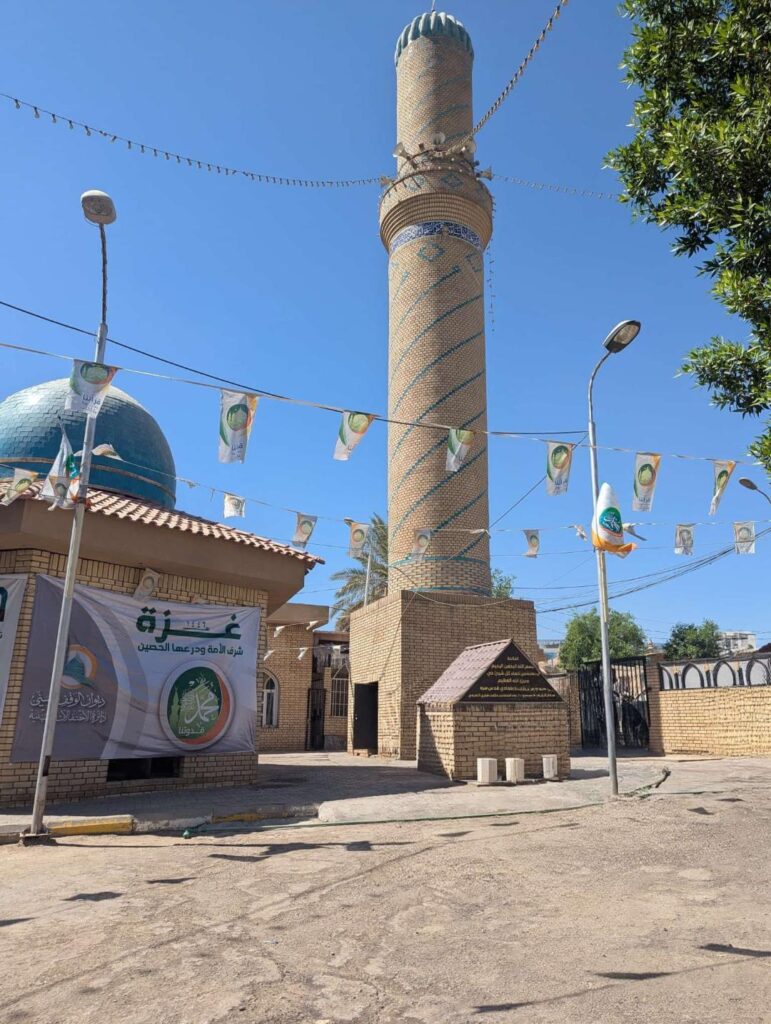
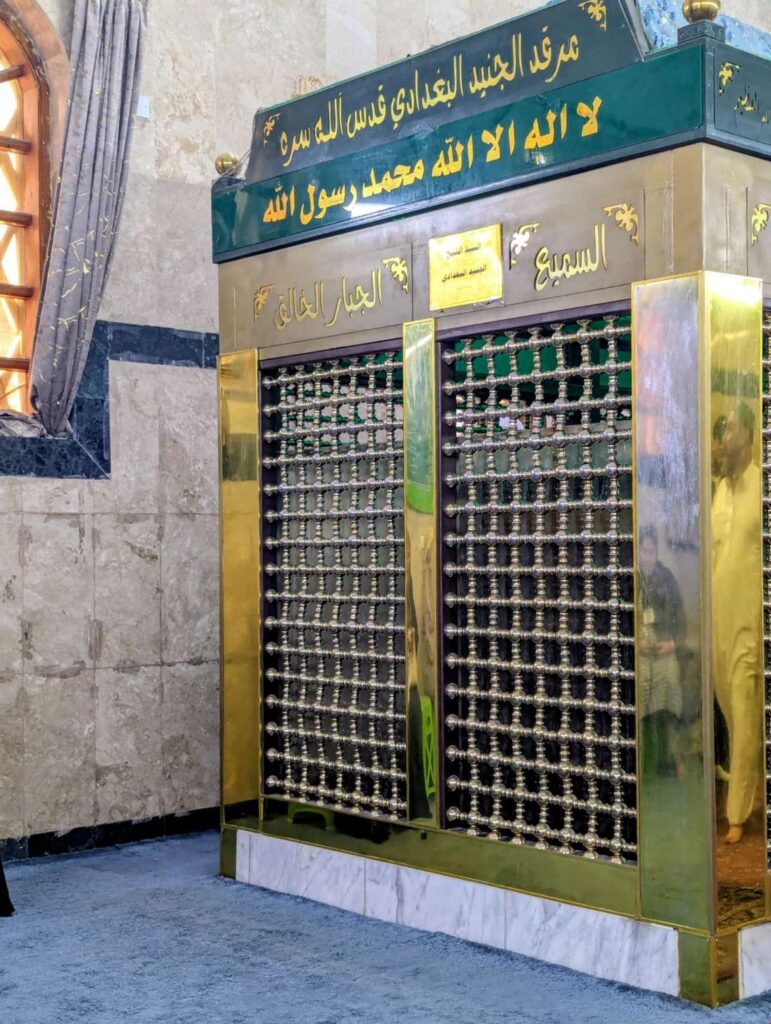
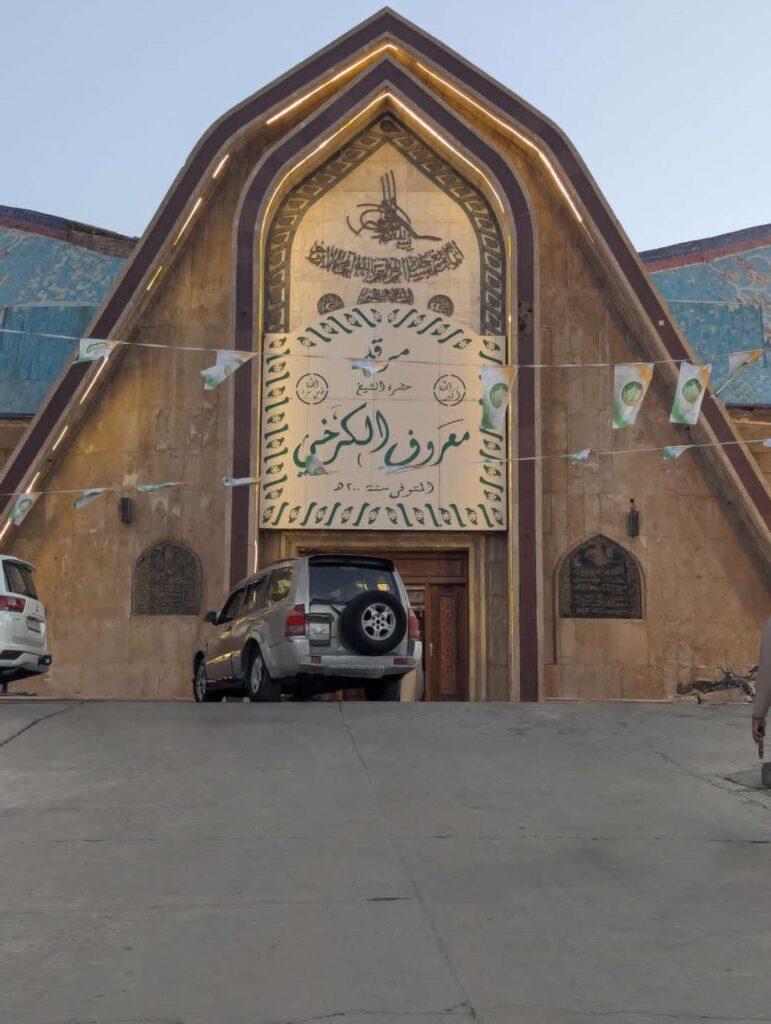
His full name was Abu Mahfuz Ma’ruf b. Firuz al-Karkhi. Shaykh Ma’ruf al-Karkhi RH was born to Christian parents but, from an early age, he rejected it, even when beaten for it at school, the whole doctrine of the Trinity and declared his conviction that God is One. Eventually, according to the same authority he ran away from home and his parents pined for him. They said in his absence that, so long as he came back to them, they would surely approve and accept whatever religion he chose for himself. Some years later, he did call at their door. He announced himself by name adding that he was now a Muslim. His parents promptly converted to Islam at his hands. Once one of Ma‘ruf Al-Karkhi RH friends asked him the following, “What is it that has caused you to abstain from the world and from the creation of God, and remain in seclusion, remembering Almighty God? Is it the fear of Death and the grave, or the fear of Hell, or the enthusiasm of attaining Paradise?” Ma‘ruf Al-Karkhi RH said, “O My Friend! You discuss such minor things. What are all these worth in front of the creator Almighty God? All these are but humble subjects of Almighty God. Once you taste the pleasure of his closeness, then you will not think of any of the other things (you have mentioned).” Shaykh Maroof Karkhi RH is well known for his high ranking in Tasawwuf. His calibre is evident from his students: Shaykh Junaid Baghdadi RH Shaykh Sarri Saqti RH Shaykh Bishr Haafi RH Shaykh Shibli RH Even Shaykh Abdul Qadir Jilani would visit his grave for meditation (they were 200 years apart).
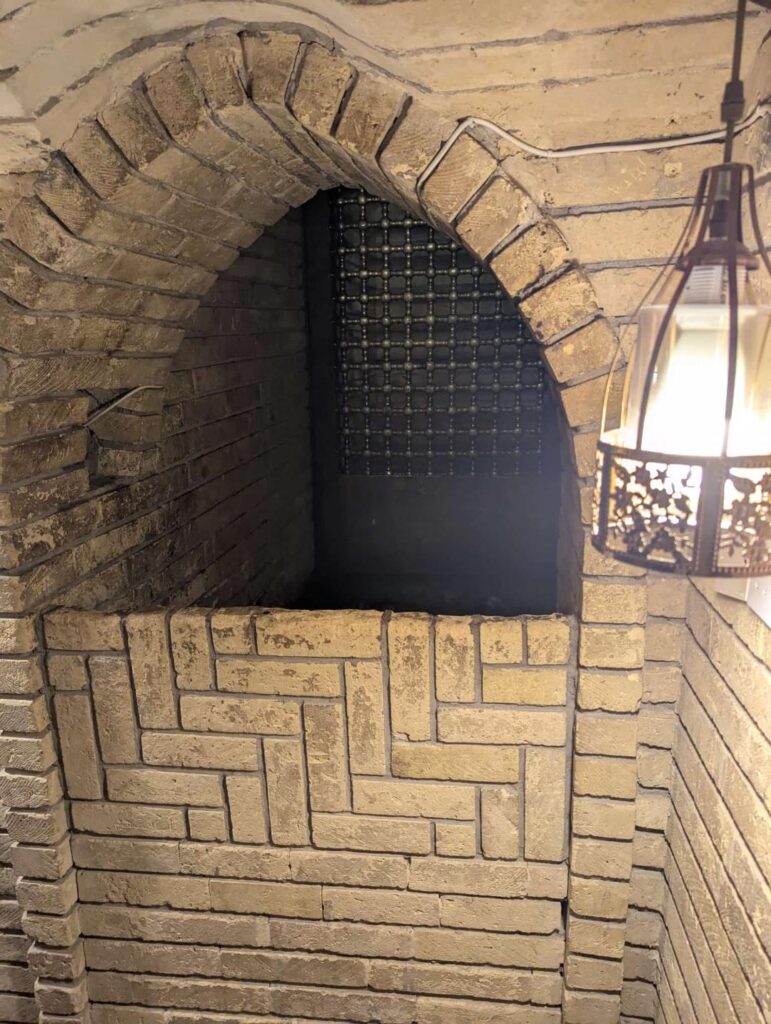
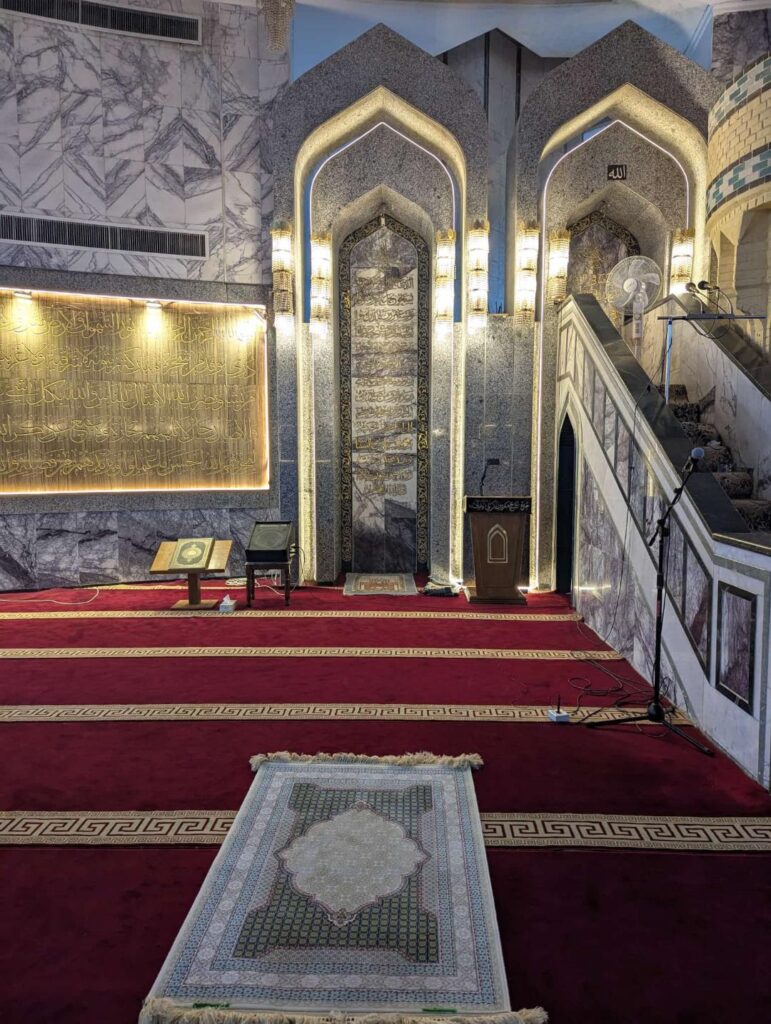
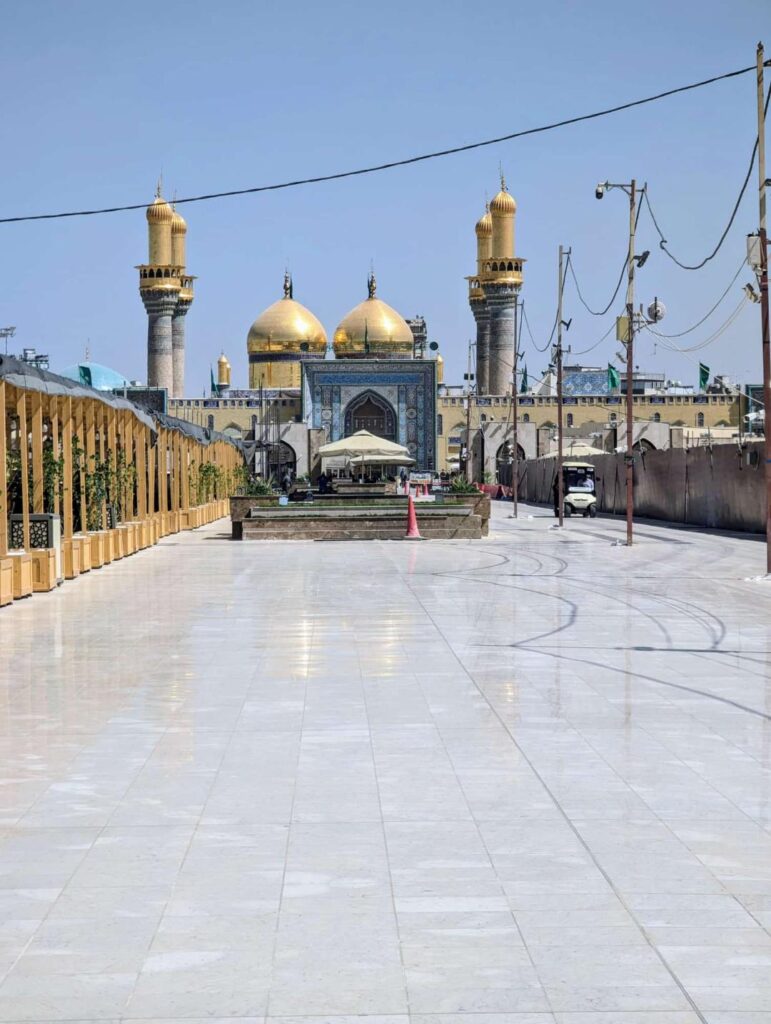
Musa ibn Jafar al-Kazim (Allah have mercy on him) was the great grandson of Hussain RA. He was born in 745 in Madiha Munawwarah, his father was Jafar al-Sadiq RH.
The Twelver Shias class Musa Kazim RH as the seventh Imam. Therefore you will see the tomb decorated with elegance.
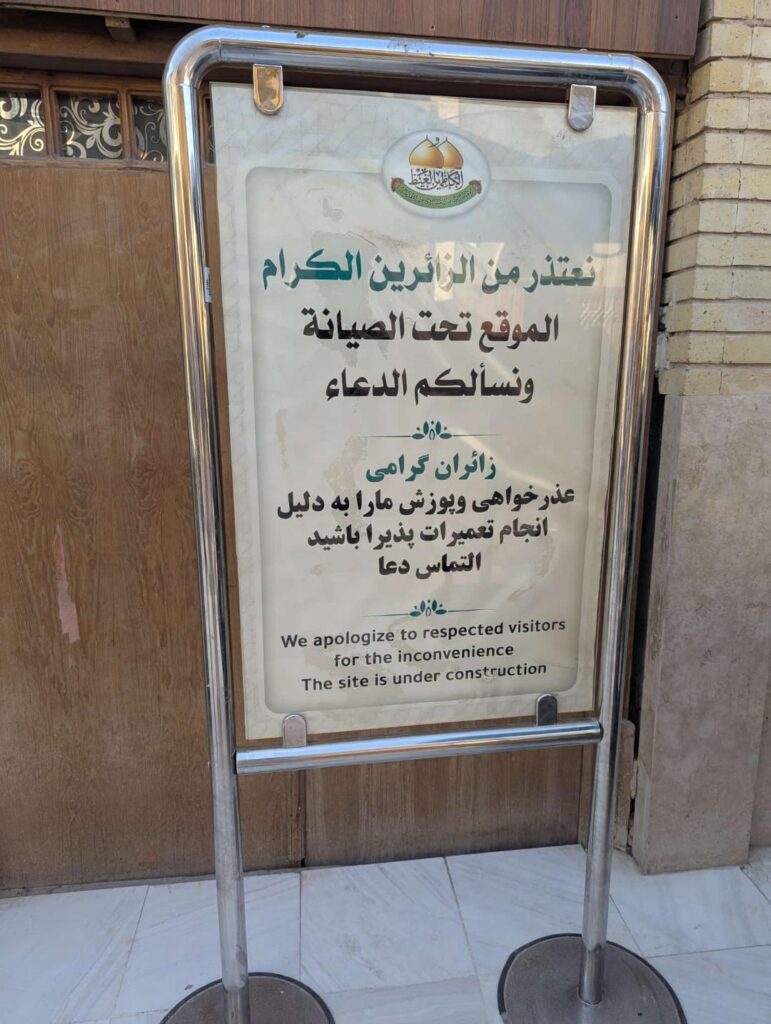
Imam Abu Yusuf Yaqub ibn Ibrahim (113-182) was the foremost student of Imam Abu Hanifah and the first chief judge in Muslim history, he was also a Hafidh of Hadith.
During the day he would listen to cases and give fatwas, during the night he would teach hadith and fiqh.
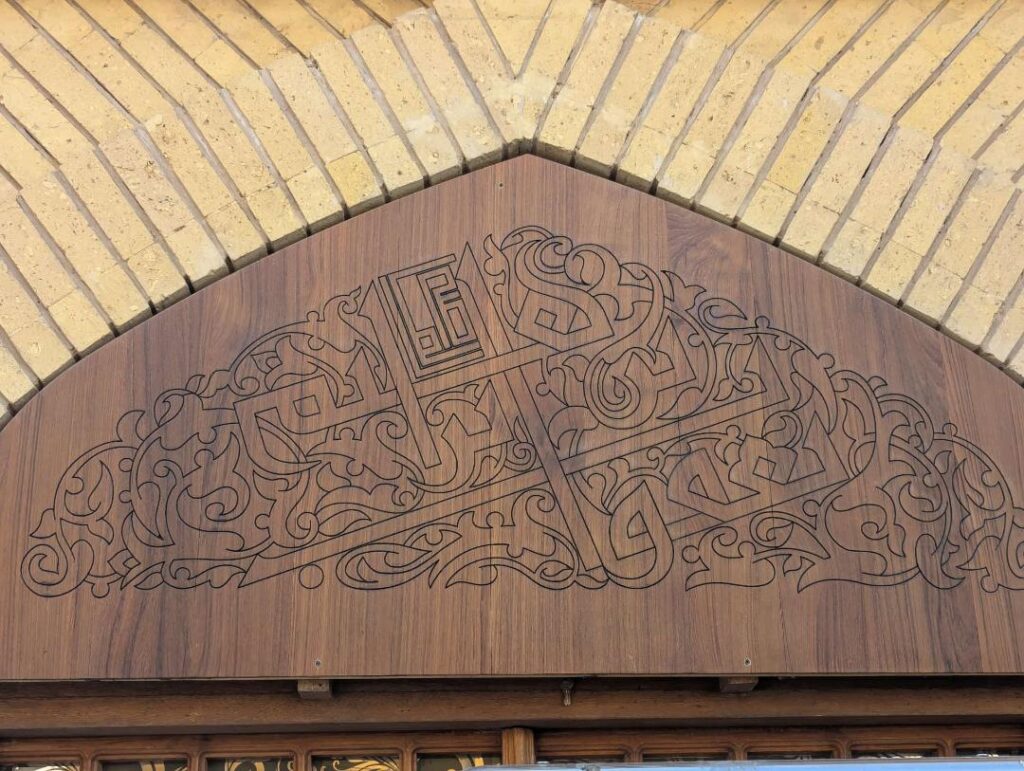
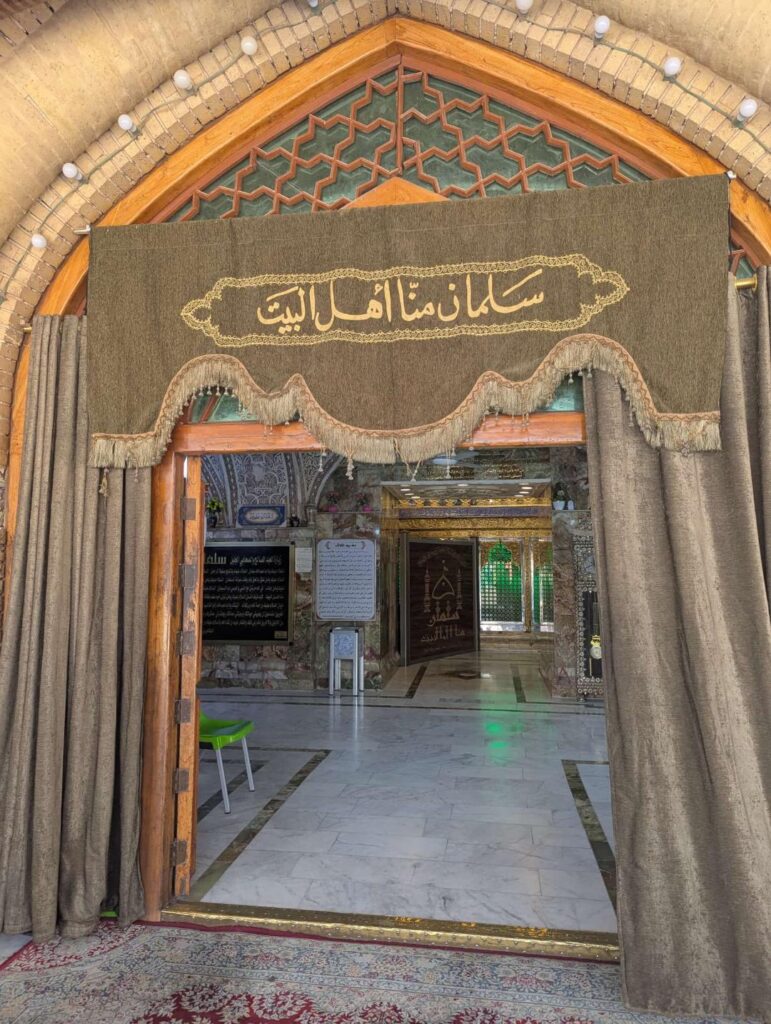
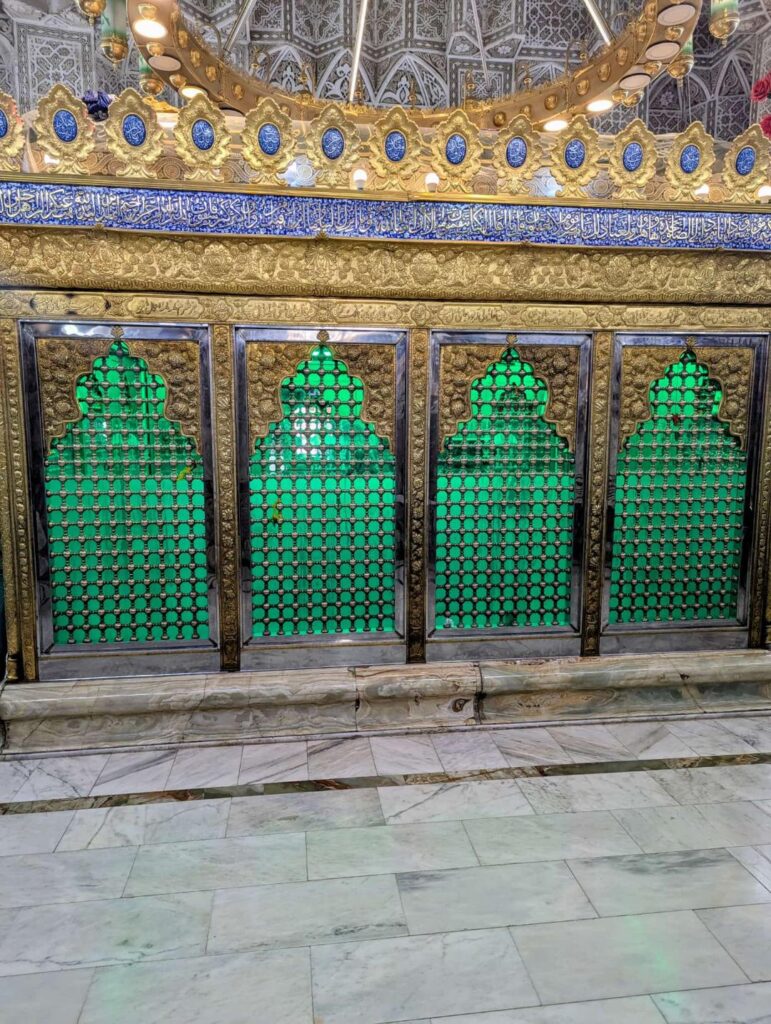
The Prophet ﷺ said: "Salman is one of us - the people of the household." (Mustadrak Hakim)
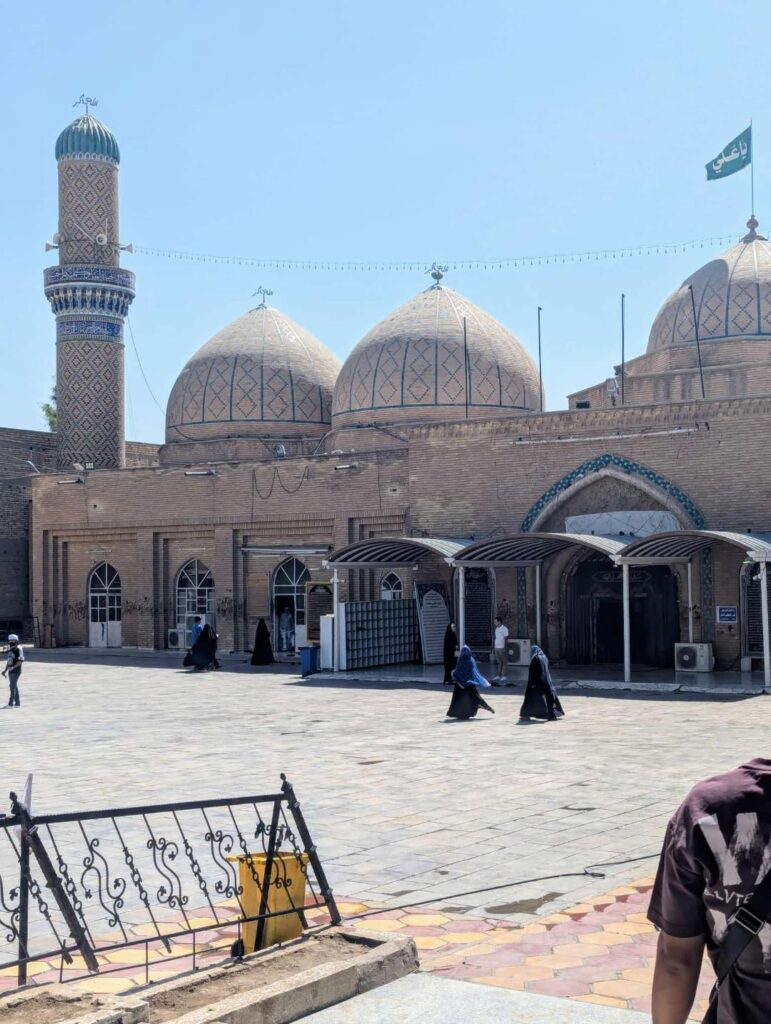
Salman Farsi (Allah be pleased with him), also known as Salman the Persian was a companion of the Prophet Mohammad ﷺ and the first Persian who converted to Islam. Salman Farsi RA was born in Isfahan, Iran, and was originally named Ruzbih. According to traditions, his father, Khushfudan, was an Iranian landholder who practiced the Zoroastrian religion. However, the family later converted to Christianity.
As Salman Al Farsi RA grew up in his hometown in Iran, his father’s love for learning about the new religion encouraged him to send his son to Syria to study under leading Christian scholars. However, Salman Al Farsi RA had other plans. He was eager to learn more about the religion of Ibrahim AS, and he used his travel plan to Syria as an escape in search of the Prophet ﷺ in the land of Arabs.
On his way to Hijaz, Salman Farsi RA was enslaved and sold to a man in the Banu Qurayza tribe in Madinah, an influential Jewish tribe. The event occurred around the same time the Holy Prophet ﷺ had recently migrated to the city from Makkah. Since both Salman Farsi and the Holy Prophet ﷺ were both in Madinah, Salman Farsi RA quickly learned about the presence of a prophet who recently migrated from Makkah.
When Salman Farsi RA first met the Holy Prophet ﷺ in Masjid e Quba in Madinah, he shared some food as a present which the Prophet (P.B.U.H.) accepted, but he didn't accept Sadaqah. Salman RA saw the seal of Prophethood and recognised that Islam's teachings aligned with the religion of Abraham.
After a few more interactions in and outside the masjid, Salman Farsi RA decided to convert to Islam solely inspired by the Prophet’s ﷺ character.
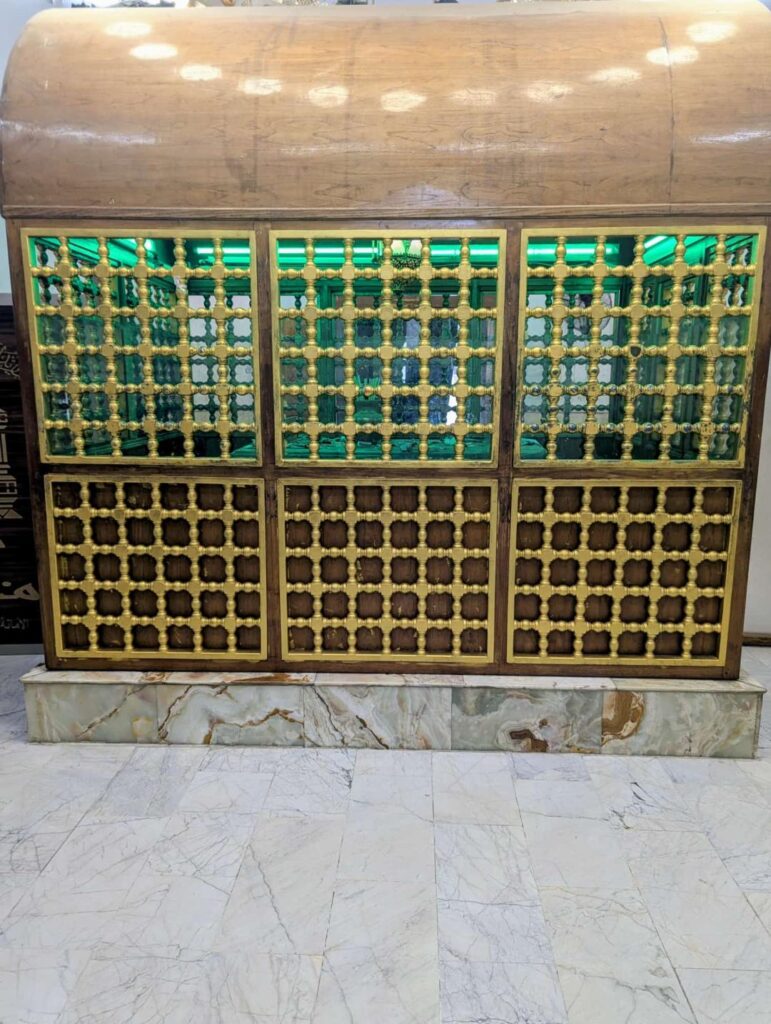
"If you wish you may consider yourself among the Muhajirin or, if you wish, you may consider yourself one of the Ansar. Choose whichever is dearer to you." With these words, the Prophet ﷺ addressed Hudhayfah ibn al-Yaman when he met him for the first time in Makkah. How did Hudhayfah RA come to have this choice'?
His father, al-Yaman was a Makkan from the tribe of Abs. He had killed someone and had been forced to leave Makkah. He had settled down in Yathrib, becoming an ally (halif) of the Banu al-Ash-hal and marrying into the tribe. A son named Hudhayfah was born to him. The restrictions on his returning to Makkah were eventually lifted.
The gravest problems the Muslims of Madinah had to face was the existence in their midst of hypocrites particularly from among the Jews. Although many of them had declared acceptance of Islam, the change was only superficial, they continued to plot and intrigue against the Prophet and Muslims. Because of Hudhayfah's ability to keep a secret, the Prophet ﷺ confided in him the names of the munafiqin. It was a weighty secret which the Prophet didn't disclose to any other companions. He gave Hudhayfah RA the task of watching the movements of munafiqin, following their activities, and shielding the Muslims from their sinister actions.
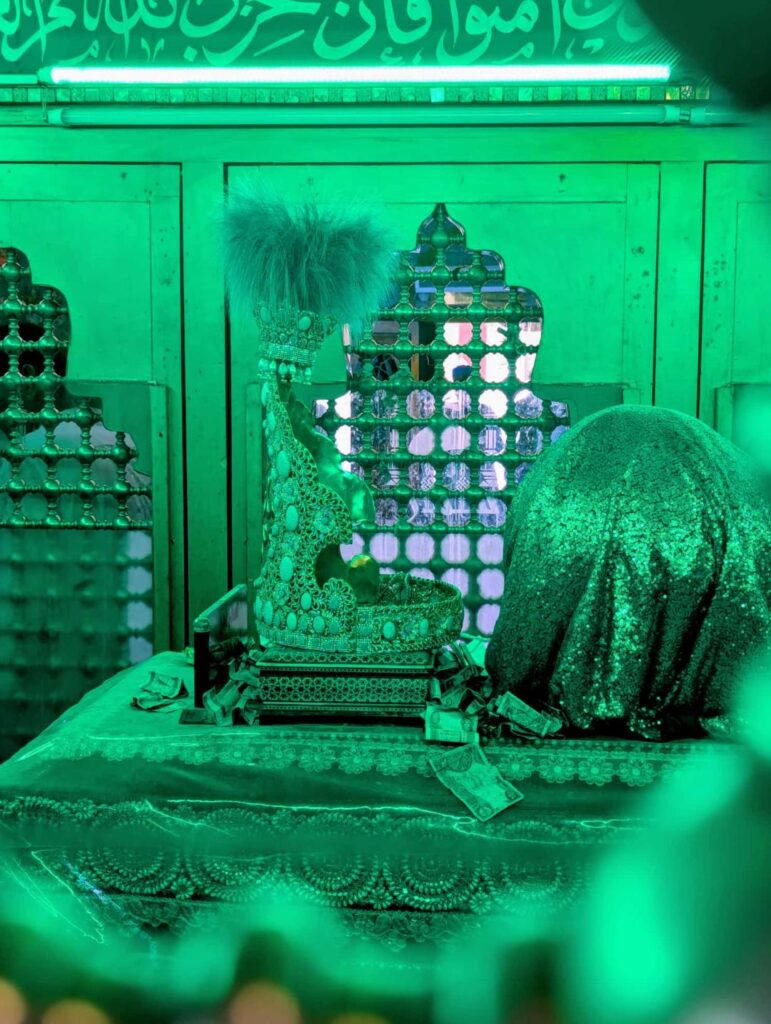
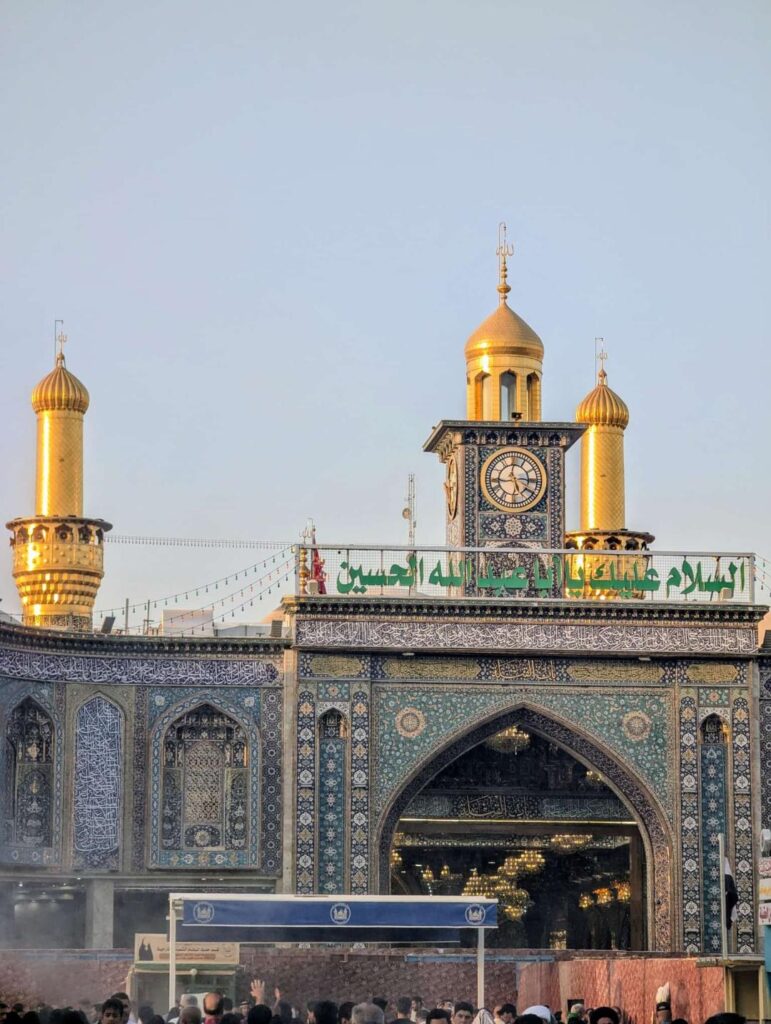
The Battle of Karbala took place on the 10th of Muharram in the year 61 A.H., approximately 50 years after the death of the Prophet Muhammad ﷺ. At this time, the Muslim rulership had been transferred to Yazid, son of Muawiyah RA. Yazid’s rulership was filled with corruption and violence, and Hussein RA son of Ali ibn Abu Talib RA and grandson of the Holy Prophet ﷺ took a stand against it. Yazid was hated for his violence, and knew Hussein RA was respected by society.
Thus, in order to validate his methods, Yazid went to force Hussein RA for his pledge of allegiance towards him. Hussein RA was raised in the Household of the Prophet ﷺ and was raised on the principles of truth and justiceAfter refusing to give allegiance to Yazid, Hussein RA took the ultimate stance for justice on Ashura, where he and his 72 companions, outnumbered by Yazid’s army of 33,000 men, were massacred.
The Battle began after the afternoon prayers – with Yazid’s army leading the attack on Hussein RA and his companions. Despite having a limited number on their side, the companions of Hussein RA fought valiantly. Eventually, Hussein RA was killed, and the bodies of the martyrs were trampled upon. This revolutionary act for Justice and to save the Truth of Islam sparks spiritual, physical, emotional, social, cultural, and political revolutions to this day.
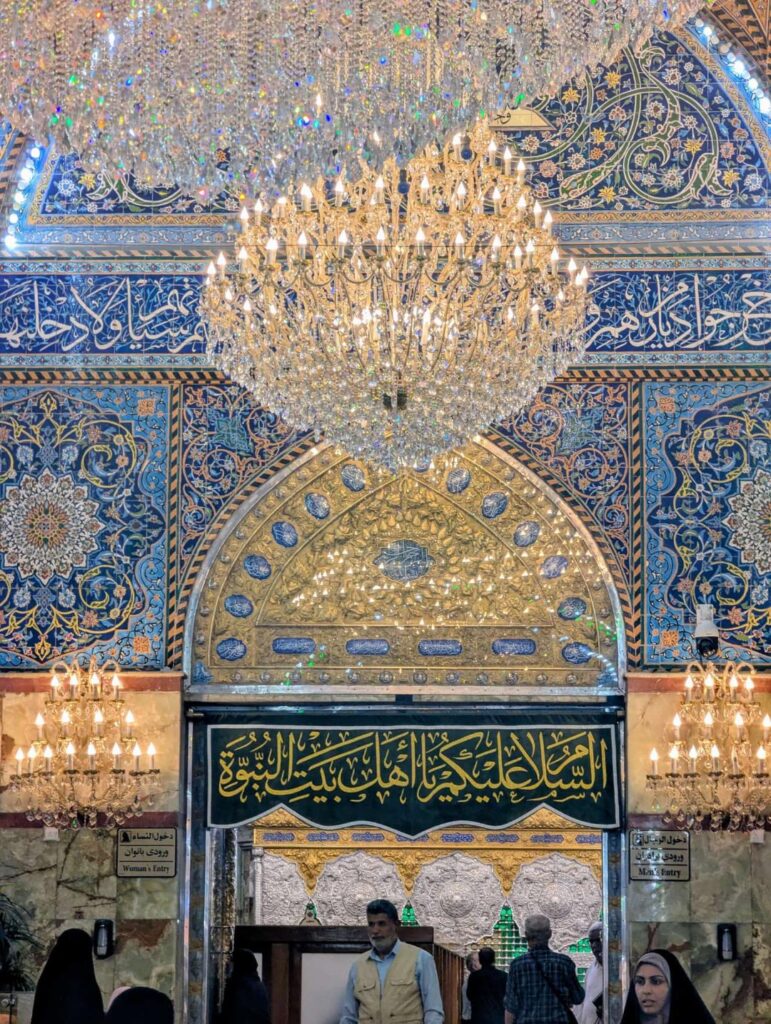
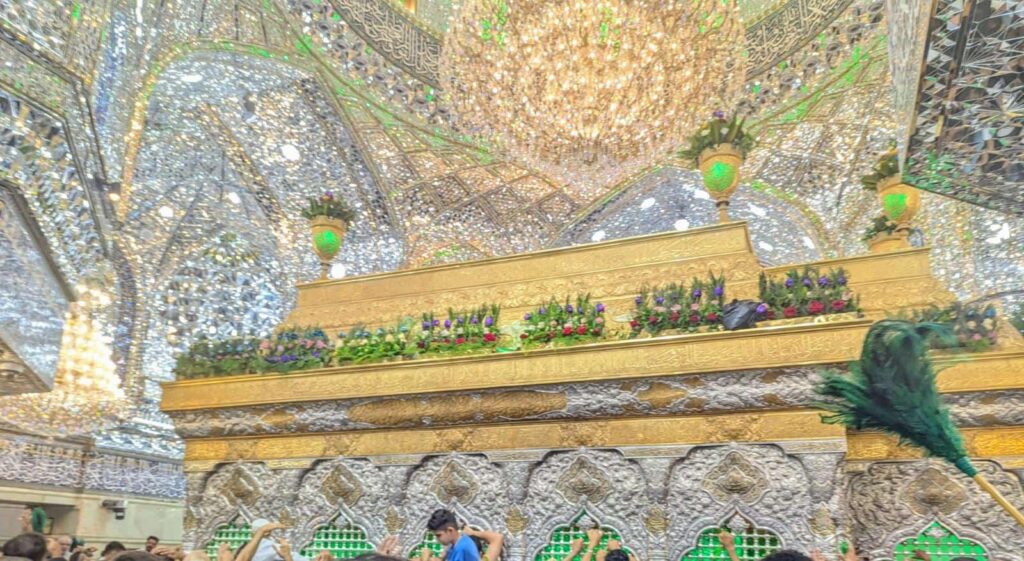
Now, we will touch upon Shias and their beliefs in brief:
There are three major branches of Shia Islam, Twelvers, Ismaili, Zaidi.
The Twelvers are the largest branch, they believe in a line of twelve divinely ordained Imams. Starting with Ali RA and ending with Imam Mahdi. Ismailis started from the sixth Imam Jafar al-Sadiq RA. Zaidis have a lot in common with Sunnis and do not believe in the concept of a hidden Imam.
The Twelvers are the largest group within mainstream Shiaism and they are the group that disrespect and curse Abu Bakr, Umar and Uthman RA due to the belief that they opposed the rising of Ali RA to be caliph.
They also disrespect the mother of believers Aisha RA. They highly respect the companions who supported Ali RA, as the is their first Imam. We have extremists in every sect, some extreme Shias even believe that Prophethood should not have been given to Muhammad ﷺ, rather it should have gone to Ali RA.
The majority of Iran are Twelvers, 95% (80 million). I have to mention this today, for the British youth who have praised Iran and Shias tremendously in the last two years (since Oct 7th) for their so-called support to Gaza. Don't be deceived by what you see online. Who killed Dr Ismail Haniyeh, the leader of Hamas last year in Tehran? Who planted the bombs six months beforehand? (Quoted by Mufti Taqi Uthmani Saheb). When the ceasefire was announced I don't recall any Gazans thanking Iran for their support? Qatar is one of the largest financial donors to Gaza and so is Turkey and there will be many Saudi citizens donating too.
Another notable group are the Alawites, mostly in Syria. They believe in the divinity of Ali RA, or even a trinity of God, Muhammad SAW and Ali. These are the Shias that killed thousands of Sunnis in the Syrian civil war and raped Sunni women in the masjid, with the microphones on, letting the whole town hear the screams of Sunni women getting raped. Think twice before you support them and praise Shia randomly because of some TikTok video you saw. Bashar Al Assad is also an Alawite, the damage he did is unforgivable.There's a lot more I can say on Shias and their hatred and oppression towards Sunnis, even in Iraq, after Saddam Hussain RH was martyred, America have put mainly Shia in charge of the government. Many of the Shia oppress Sunnis, to the point Sunnis are hiding their Sunnism and show that they are Shia. Regardless of whatever I have said above, we mustn't let our differences and hostility blind our hearts from feeling a level of humility, respect and pain when visiting these blessed places as they are the immediate family members of Nabi ﷺ.
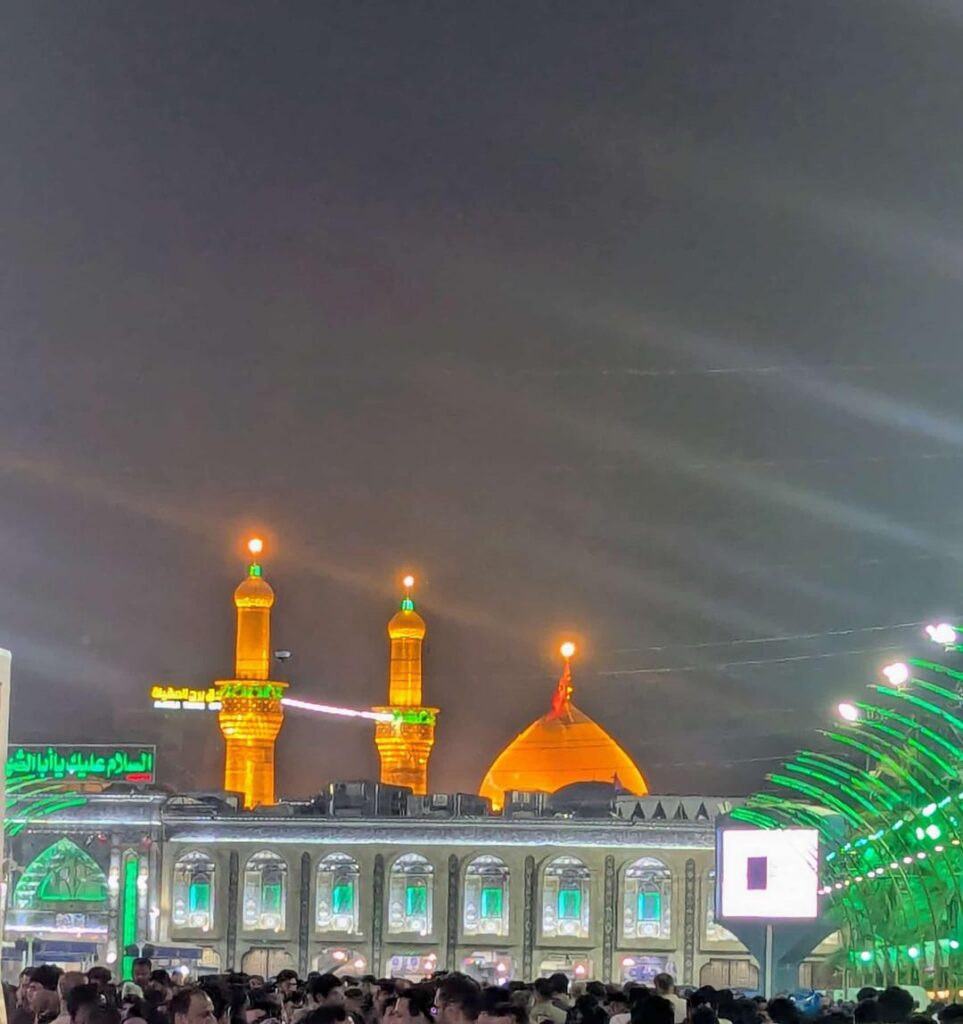
Abbas bin Ali was the son of Ali and Umm ul Banin RA. Abbas was born on 4th Shabaan 26AH. He was known for his bravery, courage, and loyalty to his family and his faith.
Ali ibn Abi Talib RA married Umm ul Banin after the death of his wife, Fatima bint Muhammad ﷺ. Ali RA was specifically looking to marry a woman who could be the perfect mother figure for his children and birth him a brave and valiant son. Ali RA instructed his brother Aqil RA to find a woman fulfilling these criteria. Aqil RA identified Umm ul-Banin. After some time, Ali proposed to Umm ul Banin RA and married her.
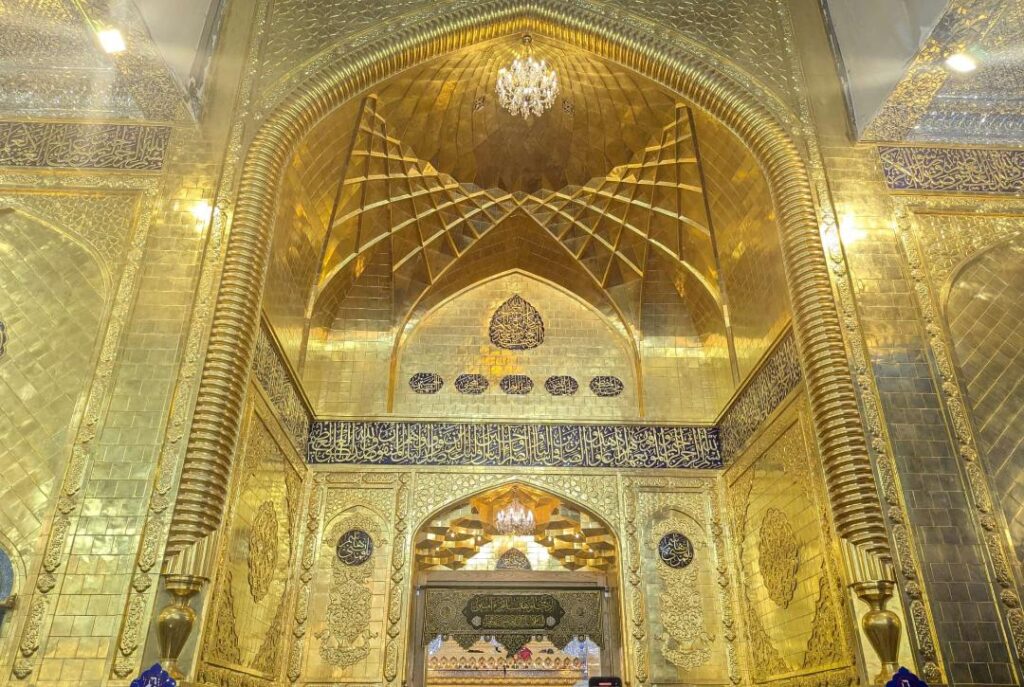
The story of Abbas’s quest to fetch water for the women and children at Karbala displayed all his good qualities in one go – none more so than his bravery. The enemies of Hussain RA had taken control of the water supply and denied Hussain RA and his camp access to water.
On the day of the battle, Hussain RA and his army fought in the unforgiving heat of Arabia whilst not having drunk a sip of water for three days. At one point during the battle, Abbas RA could no longer see the children and women of Hussain’s RA camp suffering from thirst. He decided to take action and fetch water from the Euphrates river, which was located nearby.
Abbas RA reached the river and found that the enemy army had stationed itself around it and was guarding the access to the water. Abbas RA was undeterred and bravely charged towards the enemy, wielding his sword, and managed to break through their ranks and reach the river.
He then filled a bag with water and started to make his way back to the camp. The fact that he did not drink water despite being thirsty and preferred the woman and children to drink first says a lot about his character. On the way back, he was soon surrounded by enemy soldiers who attacked him with swords and arrows. Despite being outnumbered and under attack, Abbas continued to fight fiercely, using his shield to protect the bag of water. In the midst of the fighting, Abbas was struck by an arrow that pierced his eye and had both arms chopped off. He subsequently fell to the ground, called out to Hussain RA and died in his lap.
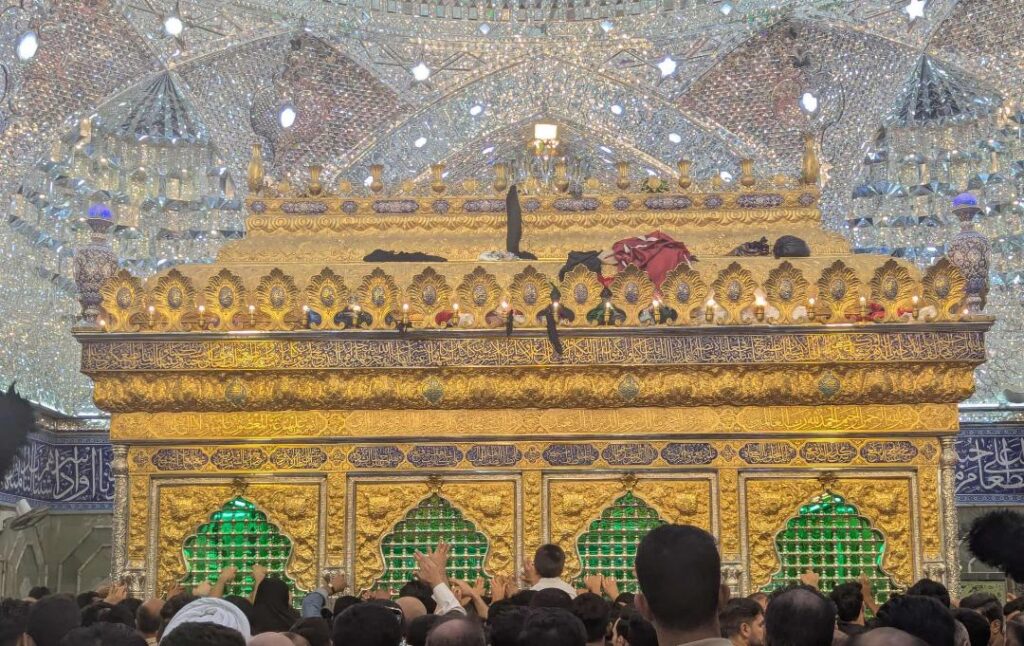
Ali ibn Abi Talib RA was the first cousin and son in law of the Prophet ﷺ, the fourth of the four rightly guided caliphs. The period of the Caliphate of Ali RA from 656 until 661 was the most tumultuous in his life. He was accused of failing to pursue the murderers of Uthman RA, foremost among his opponents was Muawiyah RA, the governor of Syria and a relative of Uthman. This led to the battle of Siffeen, which was prophecised in hadith.
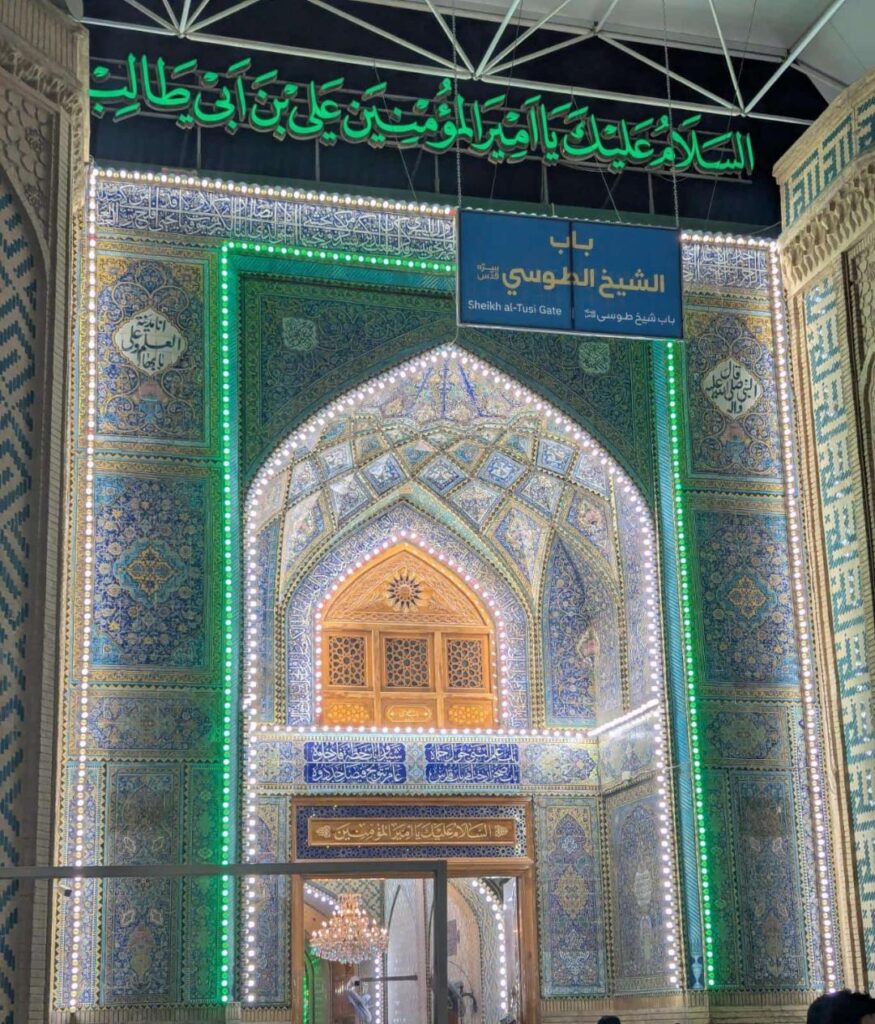
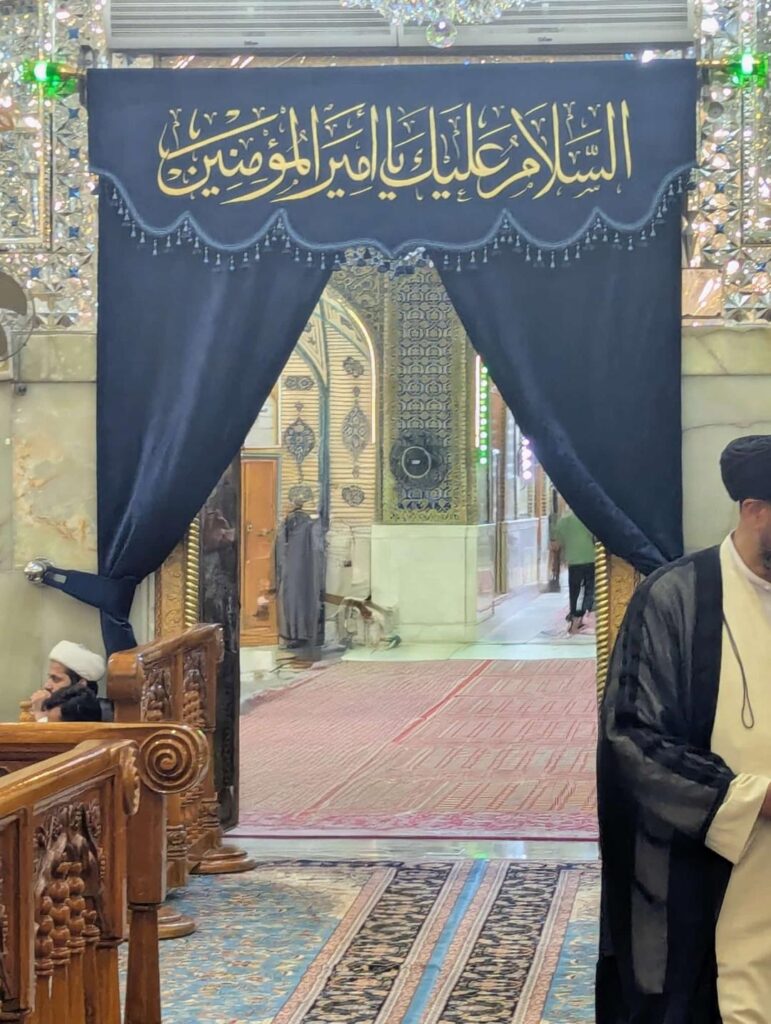
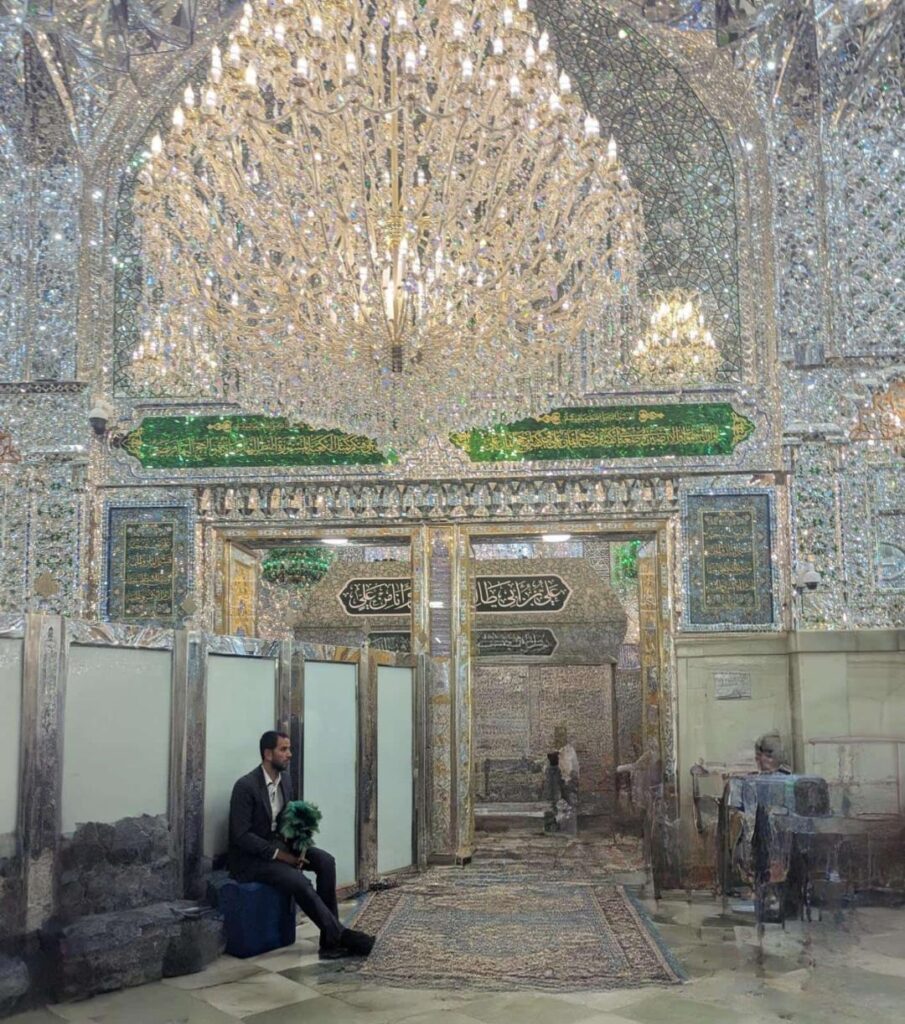
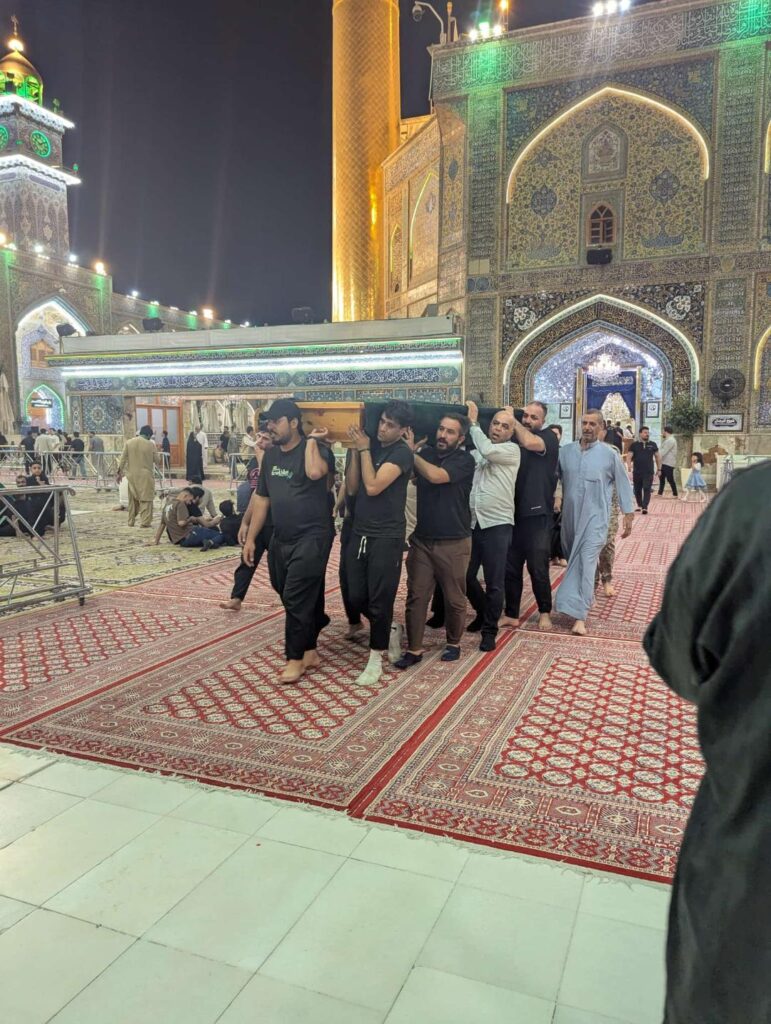
Wadee Salam, Najaf
https://youtube.com/shorts/QC0sFYPzzyE?si=7XDdDLccCkMbUI8j The world's largest cemetery, 6 million people are buried there. Every Janazah that comes into the Masjid of Ali RA does a tawaaf of the grave of Ali RA then gets buried in Wadee Salam.
The cemetery has 6 million bodies buried there, due to the fact anyone can get buried in the cemetery, Sunni or Shia from anywhere in the world, to gain the closeness to Ali (Allah be pleased with him).
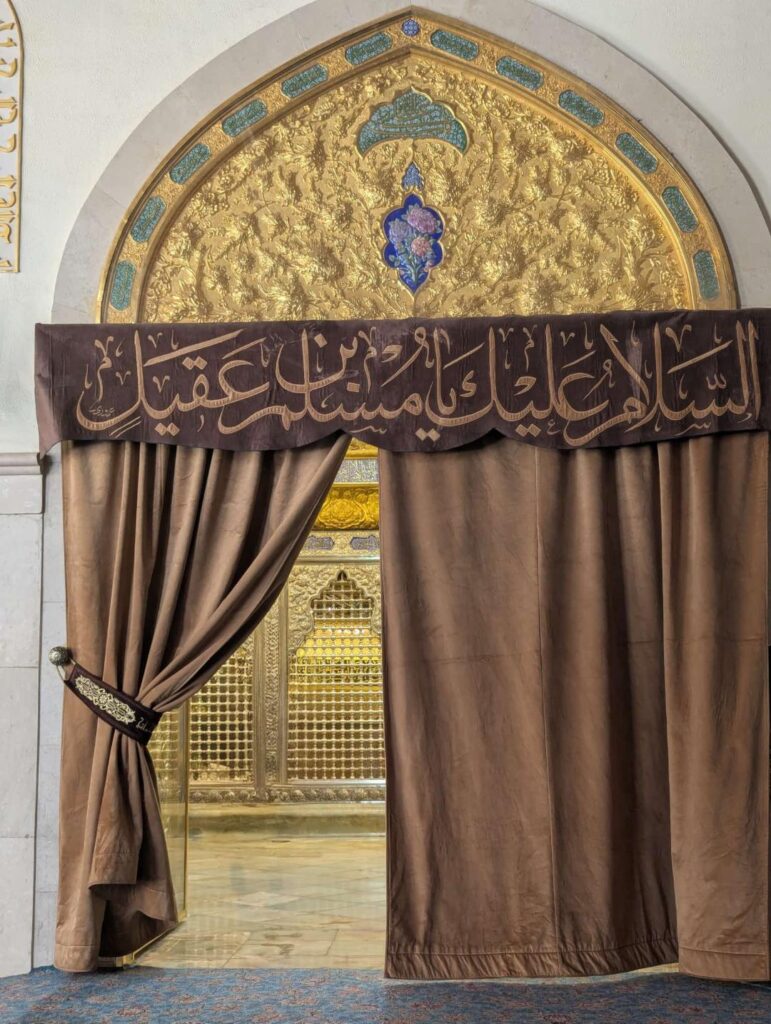
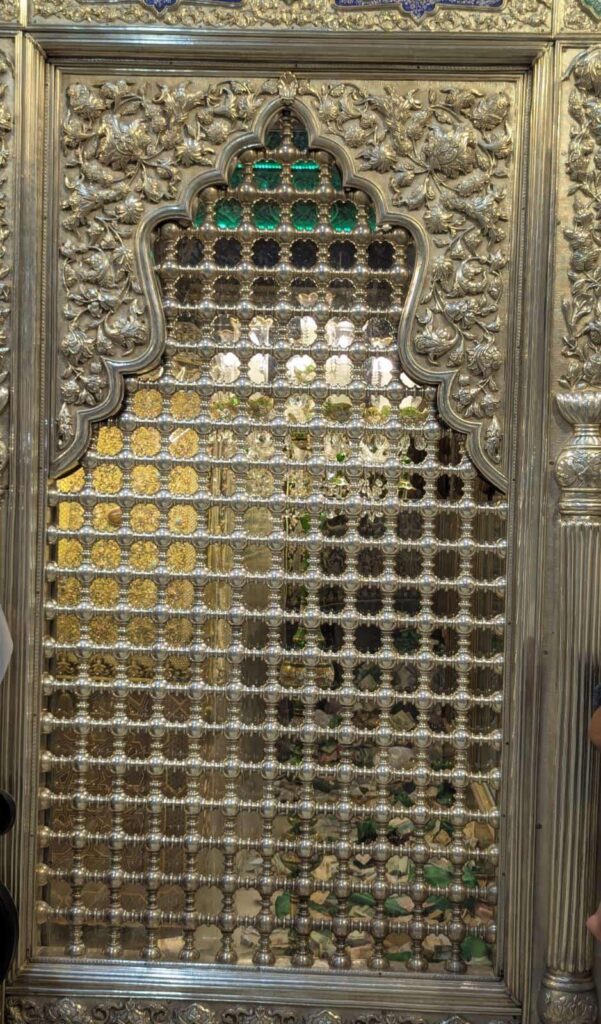
Muslim ibn Aqeel RA was the relative of the Prophet ﷺ and the son of Aqil ibn Abi Talib. Muslim ibn Aqeel RA is remembered for his bravery and moral uprightness. The Kufans welcomed Muslim and overwhelmingly pledged to support Hussain RA against the Umayyad rule. Therefore Muslim RA wrote a letter to Hussain RA and urged him to come to Kufa, thus Hussain RA left Makkah. In the meantime Muslim was executed whilst Hussain was unaware.
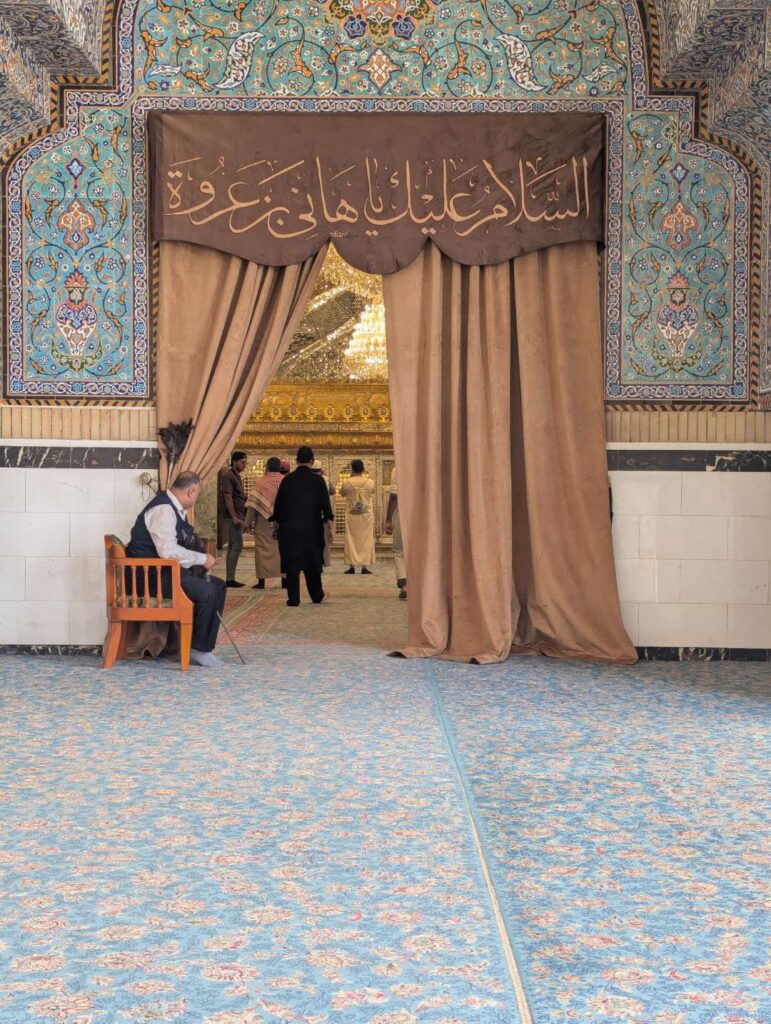
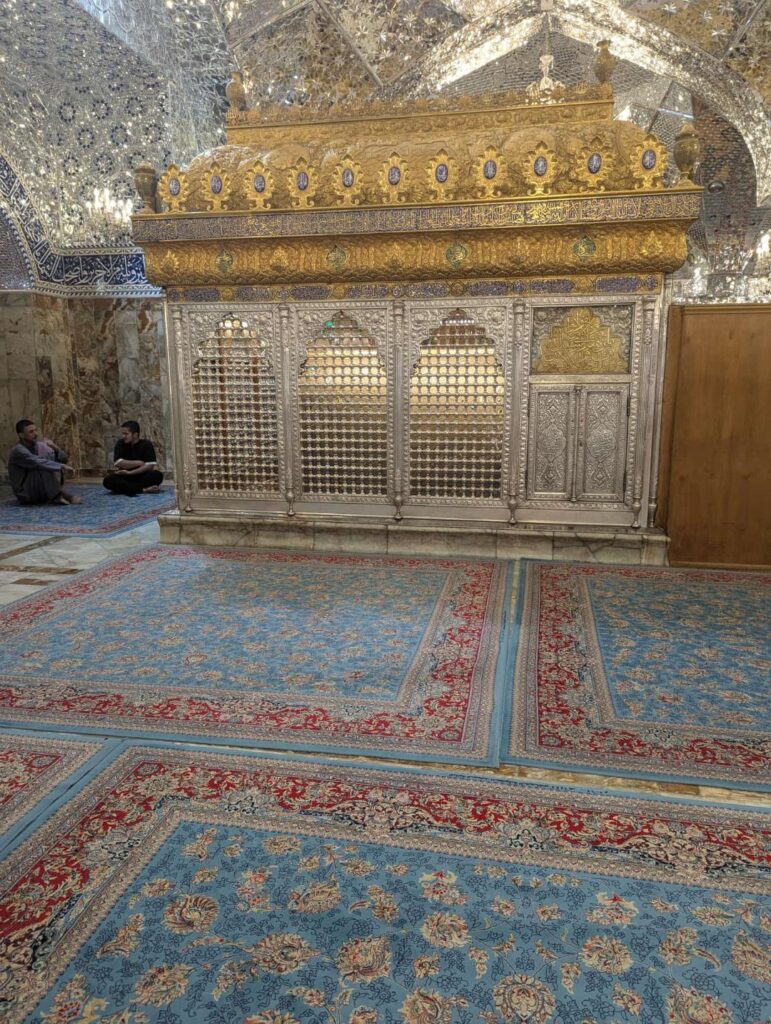
Who is Hani ibn Urwaah RA?
A Kufan leader who hosted Muslim ibn Aqeel RA. He was later killed by Ubayd Allah ibn Ziyaad, the governor of Kufa.
Why was Hani killed? Yazeed asked Hani, is Hussain on Haqq or me? Hani RA said: "Without doubt, Hussain RA is on the truth!" Yazeed ordered for him to be killed. This is the price you pay for standing on truth and principles. You may lose in this world, but the hereafter is yours.
Ismail ibn Nazir Satia (one who is in dire need of Allah’s forgiveness, mercy and pleasure)
10 Rabiul Thani 1447
﷽

1. Honour your in-laws as your own parents. Remember, it is through them that you received the wonderful man who is now your life partner.
2. Avoid comparisons. Do not compare them to your own parents in a way that makes your spouse feel his parents are inadequate.
3. Appreciate their gifts. Whatever they give, accept it with gratitude and never pass unkind remarks.
4. Speak well of them. Praise them in front of your husband, family, and friends. Even if love for them has not yet taken root, this habit will slowly cultivate genuine affection in your heart.
5. Acknowledge their humanity. Your in-laws are also human beings with faults and shortcomings. Just as you would never abandon your own parents because of their flaws, do not expect perfection from your husband’s parents. Overlook their faults, and Allah ﷻ will, in turn, conceal yours on the Day of Judgement.
6. Lower your expectations. This sacred bond is not only a major adjustment for you, but also for them. Their beloved son is no longer exclusively theirs; he now belongs to you as well. This new phase requires patience, understanding, and the willingness to share.
7. Treat them with respect. Even a single harsh word can leave behind a lasting scar and create a permanent rift.
8. Be grateful, not jealous. When your children show love to their grandparents, cherish it. Do not deprive them of this bond out of jealousy. Reflect on the point that would you be happy if your brother’s wife prevented your parents from receiving love from their grandchildren?
9. Make them feel welcome. When your in-laws visit, do everything you can to make them feel comfortable and at ease. Likewise, when you visit them, assist and help out as much as possible so that your presence brings them happiness.
10. Honor your mother-in-law. Regard her instructions as you would those of your own mother. Give priority to pleasing her, even if she at times treats you unfairly. Always speak to her with respect, never as you would to an equal. If she scolds you, remain silent with patience, and never respond with harshness.
11. Guard your children’s hearts. Never speak negatively about your in-laws in front of your children. If they overstep their boundaries, address the matter privately with your husband.
12. Do not burden your husband. Never drag him into an argument between you and your mother-in-law, as this places him in a very difficult position. If you have an issue, raise it directly with her in a respectful and dignified manner. With maturity and patience, many problems can be resolved amicably.
13. Be a giver, not a demander. Do not constantly insist on your own rights being fulfilled. Instead, focus on fulfilling the rights of others. When you adopt this attitude of selflessness, you will find that those around you will naturally begin to fulfill your rights without you demanding them.
14. Honour your in-laws with service. If your in-laws have no one else to live with, willingly offer them a place in your home especially after the passing of your father-in-law. Serving them is not a burden, but an honor that elevates you in the Hereafter, for service to creation draws you closer to Allāh Himself. Never force your husband into choosing between you and his mother; such selfishness destroys harmony. Remember, what you do will return to you. One day, you too will grow old and need care. Nabi ﷺ said: _“It is part of honoring Allāh to honor a grey-haired Muslim, and to honor the one who bears the Qur’ān (without exceeding its limits), and to honor a just ruler.”_(Sunan Abī Dāwūd)
15. Respond with patience and prayer. If your in-laws treat you unfairly, first turn to Allāh in du’ā. Then speak to your husband politely and inform him of the situation. Learn to forgive and let go of grudges. Rasūlullāh ﷺ said: _“Allāh elevates the status of one who forgives. Whoever humbles himself for Allāh, Allāh will raise him.” (Sunanut Tirmidhī)
16. Encourage family ties. Always motivate your husband to maintain good relations with his family, especially parents, brothers, and sisters. Many estrangements occur after becoming spouses due to stories or complaints conveyed by wives. Treat all elders respectfully, like the wives of your husband’s elder brothers. For younger relatives, be kind, loving, and assist them as much as possible in their work.

740 words – 4 minutes read
In our Deen, we have a principle that when it comes to all things, anything is permissible unless there is evidence to deem it prohibited with the exception of acts of worship. When it comes to anything outside of the realm of worship, it is neutral unless there is something that makes it prohibited or praiseworthy. So when you look at any political strategy, you’re not going to be asking the question about whether or not it’s prohibited on the basis of trying to prove whether Nabi ﷺ did it. You’re going to be looking at the implications of that action and if there are any explicit or ambiguous things that come with it that are in violation of the Deen OR if there are elements of it that serve a noble cause and this, if practised with the right intention, could actually be rewardable. Boycotting is one those things that you don’t need to prove whether it’s from the Sunnah but rather analyse the strategy and see how we can make it both useful and faithful.
Sometimes, some things do not have to be directly from sacred texts but from the natural sense of honour and protectiveness and dignity that Allah naturally puts inside us, within our fitrah that naturally makes you feel an aversion or an affinity to certain things. For example, if you were living in Makkah as a secret Muslim and Nabi ﷺ had already migrated to Madinah, would you still do business with Abu Jahal? With Abu Sufyan? Without an order coming from Nabi ﷺ, we would know inside of us that something feels wrong about this. Going to the marketplace and dealing with these people… something feels off without having to hear a single hadeeth of Nabi ﷺ. This should be a natural feeling within us for our brother and sisters.
An incident that comes to mind is something that happened in Madinah between the wife of Nabi ﷺ, Umm Habibah and her father Abu Sufyan. When Abu Sufyan came to speak to Nabi ﷺ regarding the violation of the Treaty of Hudaybiyyah, he entered their home and his daughter, Umm Habibah RA, picked up the mattress Nabi ﷺ would sit on in a way that she could sit on it but not her father, Abu Sufyan (maybe folded it in half). She knows what her father does to the Muslims, she knows her father is an enemy of Islam. Her father was bewildered and asked, ‘Are you protecting that from me or me from it?’ She replies, ‘No, I don’t find it befitting that you sit on the mattress of Nabi ﷺ.’ That wasn’t scriptural. That came from a place of dignity and honour for Nabi ﷺ just like how we should feel for our brothers and sisters who are persecuted by the enemy.
Moving on, boycotting is a form of character building. Yes, it’s inconvenient. Yes, it hampers your privileges. Yes, it means you may have to do things the long and hard way. But this controlling of the nafs will be beneficial in the long run. It’s a personal thing. It strengthens you spiritually because you didn’t feed into every whim and desire of your nafs. It’s a type of personal growth.
Thumama RA was a powerful merchant based in Yamamah from where the Makkans would buy their wheat. In his anger against the Quraysh, he put a stop on the wheat exportations to Makkah to the extent that the prices of wheat shot up, there was extreme hunger in Makkah. This was the first boycott from a Sahabi. Nabi ﷺ didn’t admonish him and him not saying anything is paving way to its permissibility. The boycott was only lifted when they wrote to Nabi ﷺ begging for it to be lifted and out of the kindness of Nabi ﷺ, the boycott was ended and Thumama RA restarted the exporting of wheat into Makkah.
The concept of reducing/removing sins will forever stand and we understand that there are wider ramifications to our sins. That is a personal thing between you and Allah and one that has to be worked on always and forever. Boycotting comes under the ‘body is like one Ummah’ hadeeth. Compassion, empathy, doing EVERYTHING we possibly can.
Nabi ﷺ didn’t explicitly go out in protests, didn’t petition, didn’t lobby…that doesn’t mean it is impermissible or that it doesn’t have positive results.
Umm Khadeejah
10th Muharram 1447
Assalamu alaykum wa rahmatullahi wa barakatuh,
Dear Shaykh,
“I am struggling with intrusive thoughts, doubt and anxiety in worship. Am I sinful? Any advice would he helpful, JzkAllah“
Answer:
First and foremost, I want you to know that you are not alone in this struggle. What you are experiencing, intrusive thoughts, doubts, and anxiety in worship, is something many sincere believers have faced, including some of the sahabah.
1️⃣ You are NOT sinful, these thoughts do not make you a disbeliever.
I know these thoughts make you anxious and distressed, but they do not define you or your Iman. In fact, feeling upset by them is a sign of faith!
📖 The Sahabah once told the Prophet ﷺ:
“We have thoughts that are so terrible we would rather be burned than speak them.” The Prophet ﷺ replied, ‘Allahu Akbar! Praise be to Allah who has reduced shaytan’s influence to mere whispers!'”
(Sahih Muslim 132)
💙 This means shaytan whispers to believers to make them doubt themselves. But these thoughts are not yours, and Allah does not hold you accountable for them.
2️⃣ Creating these thoughts are shaytan’s trick, your job is not to engage with them, just learn to ignore them.
These thoughts only become stronger when you pay attention to them. Shaytan wants you to repeat wudu, repeat shahada, repeat salat until you feel so exhausted that you stop praying. DO NOT LET HIM WIN.
📖 The Prophet ﷺ said:
“Shaytan will come and say: ‘Who created this? Who created that?’ until he says, ‘Who created Allah?’ If this happens, let him seek refuge in Allah and STOP thinking about it.” (Sahih al-Bukhari 3276, Muslim 134)
✅ What to do:
– IGNORE the thoughts completely. Do NOT debate them in your head.
– Say: “A’udhu billahi min ash-shaytan ir-rajim” (I seek refuge in Allah from shaytan).
– Distract yourself immediately, shift your focus to Qur’an, dhikr, or any other task.
➡️ Remember: The less you engage with the thoughts, the weaker they become.
You might be getting these thoughts even in Ramadan despite shaytan being locked away, this is normal as shaytan lays down his traps and gets us used to listening to these thoughts even without him being here.
3️⃣ STOP repeating shahada, wudu and salat
I know it feels like you have to redo everything because of doubt, but repeating wudu and salat is exactly what shaytan wants.
📖 The Prophet ﷺ said:
“If one of you feels doubt in his wudu, let him not leave (his prayer) unless he hears a sound or smells something.” (Sahih Muslim 362)
✅ What to do:
– Do wudu ONCE, even if you have doubts, move on.
– Pray ONCE and do not repeat salat at all.
– If thoughts come, keep praying and ignore them.
➡️ If you fight the urge to repeat, it will get easier, inshaAllah.
4️⃣ Make salat a place of comfort again
I know salat has become a source of anxiety, but it is supposed to be your place of peace. Take small steps to make it easier:
– Keep your prayers simple and try to focus on one posture at a time.
– Listen to soothing Qur’an before salat to get into a peaceful mindset.
– Take deep breaths before praying to relax your mind.
📖 Allah says:
“And seek help through patience and prayer, and indeed, it is difficult except for the humble.” (Surah Al-Baqarah 2:45)
5️⃣ Seek assistance through duas & ruqyah.
📖 Allah says:
“And if an evil whisper from Shaytan reaches you, then seek refuge in Allah. Indeed, He is the All-Hearing, All-Knowing.” (Surah Al-A’raf 7:200)
✅ Duas to Recite:
– A’udhu billahi min ash-shaytan ir-rajim
– Ayatul Kursi (Surah Al-Baqarah 2:255)
– Surah Al-Falaq & Surah An-Nas (morning & evening)
– La ilaha illa Allah, wahdahu la sharika lahu, lahu al-mulku wa lahu al-hamdu, wa huwa ‘ala kulli shay’in qadeer.
➡️ These will help ease your heart and push away these intrusive thoughts.
6️⃣ Sometimes, waswasah(intrusive thoughts) can be linked to anxiety or OCD, which is a condition many people face. If these thoughts are making life extremely difficult, it might help to speak to one of our therapists. There is no shame in seeking help.
💙 You are NOT sinful. You are NOT a bad Muslim.
💙 Allah is Most Merciful, and He knows your struggle.
💙 You will NOT go to Hell for thoughts you didn’t bring into your mind.
📖 Allah says:
“Do not despair of the mercy of Allah. Indeed, Allah forgives all sins…”
(Surah Al-Zumar 39:53)
➡️ Keep going, my dear brother/sister. You are stronger than Shaytan, and Allah sees your effort. 🤍
🌸 May Allah grant you ease, comfort and a heart full of tranquillity. Ameen. 🤲
بسم الله الرحمن الرحيم

To celebrate growing older, I wrote a few lessons life has taught me, alhumdu lillah.
Free five bonus!
Ismail ibn Nazir Satia (one who is in dire need of Allah’s forgiveness, mercy and pleasure)
18th Shaban 1446
16th April 2025

Dear Quran,
How do you do this?
Every single time, I open you up, with an issue on my mind, and you answer it, and you blow me away. It’s like I don’t read you, its like you read me.
You shatter each doubt, you break each barrier, you wipe away each tear, and you comfort like no one else. Sometimes I’m terrified to open you up, and set my eyes upon your lines, because I know, I know it’ll be like uncovering my soul, I know it’ll be out of my control, I know my heart will melt, and my eyes overflow, so I fear opening you, until, until I’m completely alone, just you, and I and my Rabb.
It’s like you read me,
You see right through the facade,
You address each subconscious thoughts,
You answer each unanswered questions,
You shatter each doubt, and break each barrier,
You wipe away each tear,
You uncover the soul and heal each wound,
Every single time.
Sometimes it’s too intense to bear,
Sometimes the uncovering of the faults and flaws hurt,
Sometimes you advice with words that I don’t want to hear,
But you’re never wrong.
And although before I open up to you,
Sometimes I feel scared,
It’s always worth it in the end,
Dear Quran, how do you always know what I need to hear?
Dear Quran, how do you console so beautifully? So completely?
You leave me so intrigued.
(Diary excerpt June 2016)
Anonymous
